Air Conditioning
How to Choose: Heat Pump or Traditional Air Conditioning?

We’re available to assist you in deciding between a heat pump and traditional air conditioning.
When it comes to keeping your home cool and comfortable, it’s important to weigh the pros and cons of each option. In this article, we’ll delve into the energy efficiency, cost considerations, and other factors you need to consider.
By the end, you’ll have the knowledge you need to make an informed decision that serves your needs best.
Let’s dive in!

Key Takeaways
- Heat pumps are highly energy efficient and can help reduce utility bills
- Traditional air conditioning units have a lower upfront cost compared to heat pumps
- Heat pumps provide both heating and cooling capabilities, while traditional AC units only provide cooling
- Heat pumps have a lower environmental impact and consume less energy compared to traditional AC units
Pros and Cons of Heat Pumps
When considering heat pumps, we should weigh the pros and cons to make an informed decision.
Heat pump technology offers a range of benefits that are worth considering. Firstly, heat pumps are highly energy efficient, as they transfer heat from the outside air or ground to heat or cool our homes. This means lower energy consumption and reduced utility bills.
Secondly, heat pumps are versatile and can provide both heating and cooling, making them suitable for different climates. They can extract heat even in cold temperatures, making them ideal for regions with mild winters.
However, it’s important to consider the climate suitability for heat pumps. In extremely cold climates, their efficiency may decrease, requiring supplementary heating.
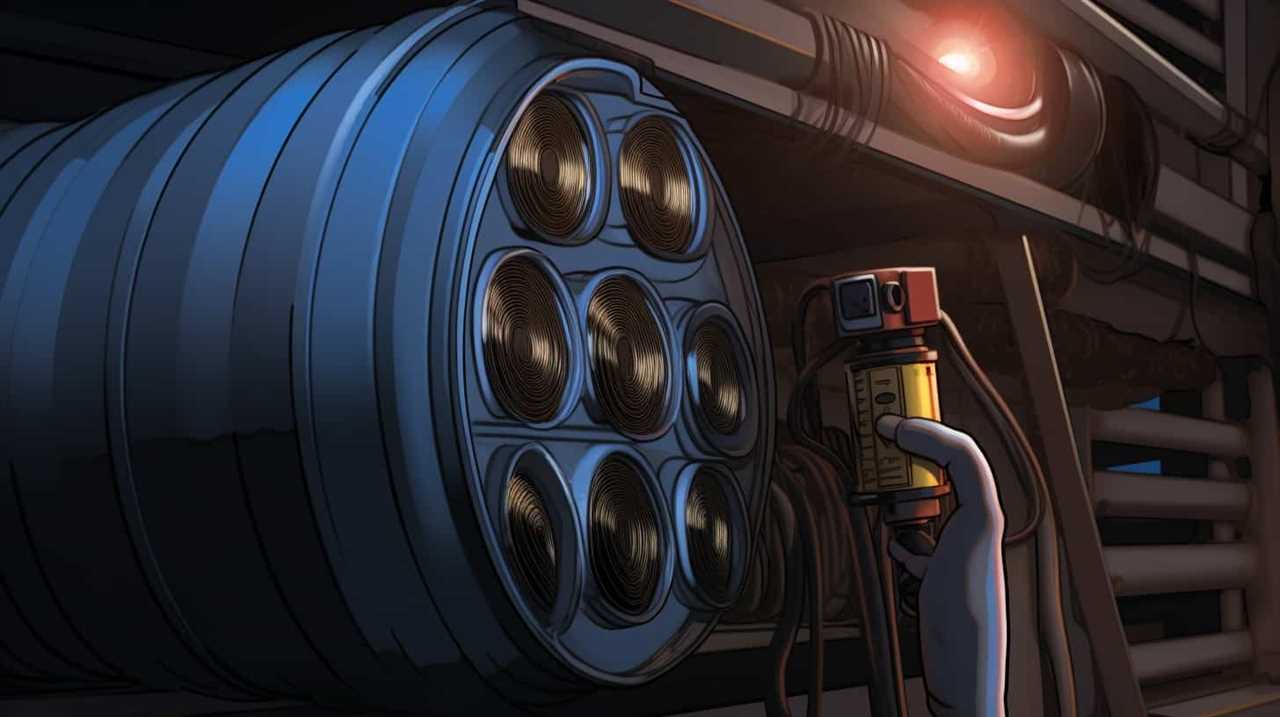
Transitioning to the subsequent section, let’s now examine the benefits and drawbacks of traditional air conditioning systems.
Benefits and Drawbacks of Traditional Air Conditioning
Now let’s explore the benefits and drawbacks of traditional air conditioning systems.
Here are the advantages of traditional air conditioning:
-
Reliable Cooling: Traditional air conditioning systems are known for their ability to provide consistent cooling throughout a space, ensuring comfort even during the hottest days.
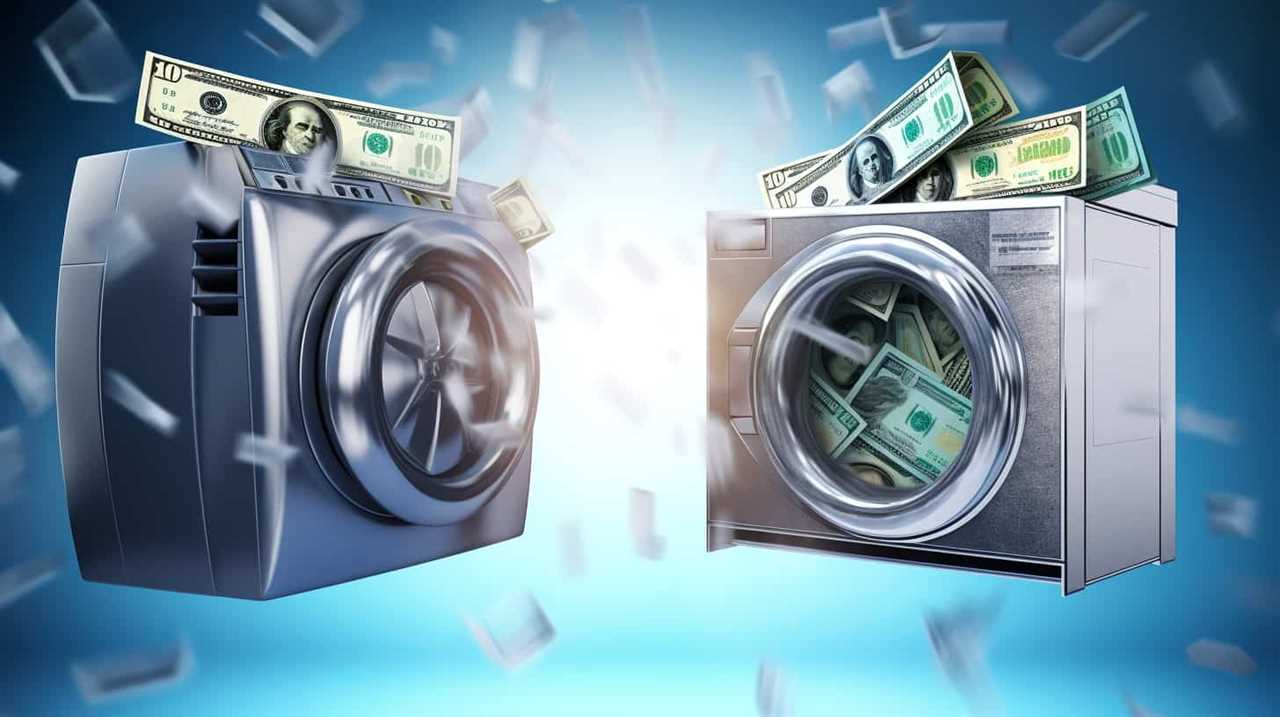
-
Lower Initial Cost: Compared to heat pumps, traditional air conditioning systems generally have a lower upfront cost, making them a more budget-friendly option for homeowners.
-
Effective in Humid Climates: Traditional air conditioning systems are particularly effective in areas with high humidity levels, as they’re designed to remove moisture from the air, creating a more comfortable indoor environment.
-
Ease of Maintenance: Traditional air conditioning systems are relatively simple to maintain and repair, with a wide availability of parts and skilled technicians, ensuring minimal downtime.
However, it’s important to consider the disadvantages of traditional air conditioning:
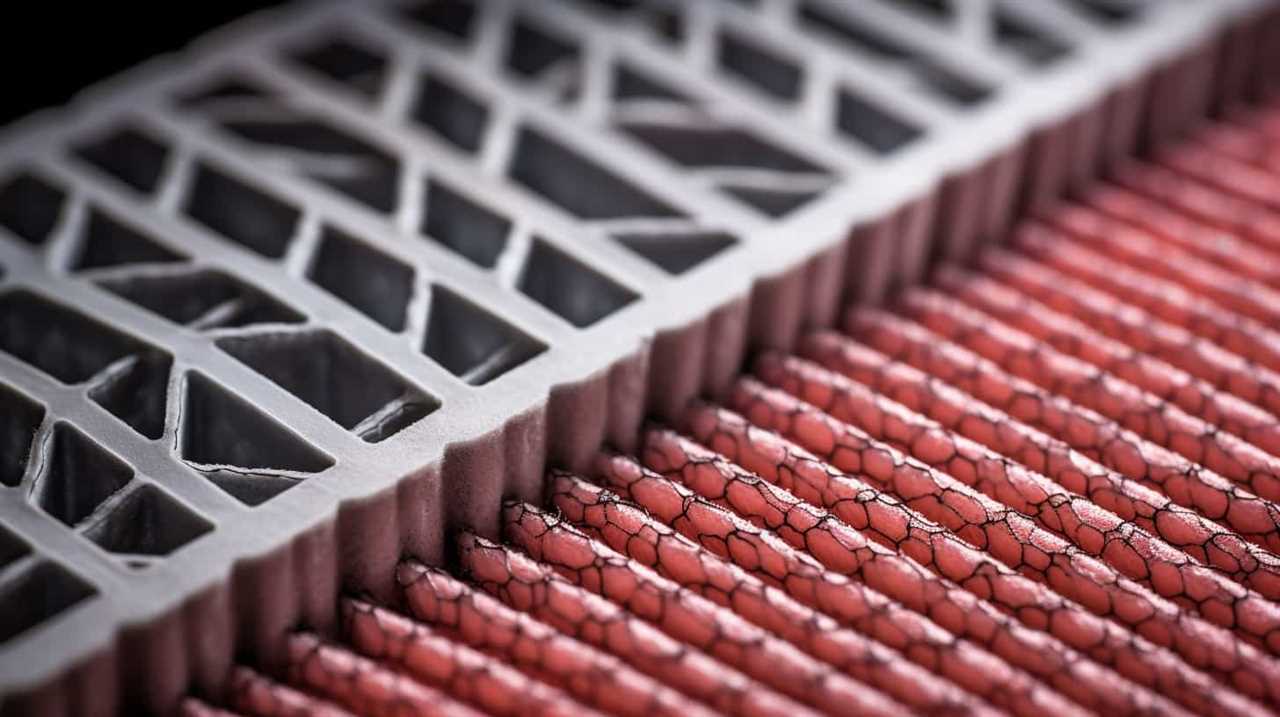
-
Higher Energy Consumption: Traditional air conditioning systems tend to consume more energy, resulting in higher electricity bills compared to more energy-efficient alternatives.
-
Environmental Impact: Traditional air conditioning systems rely on the use of refrigerants that contribute to ozone depletion and global warming, posing environmental challenges.
-
Limited Heating Capability: Unlike heat pumps, traditional air conditioning systems don’t provide heating capabilities, requiring separate heating systems for colder months.
-
Limited Temperature Control: Traditional air conditioning systems often lack precise temperature control, leading to fluctuations in room temperatures.
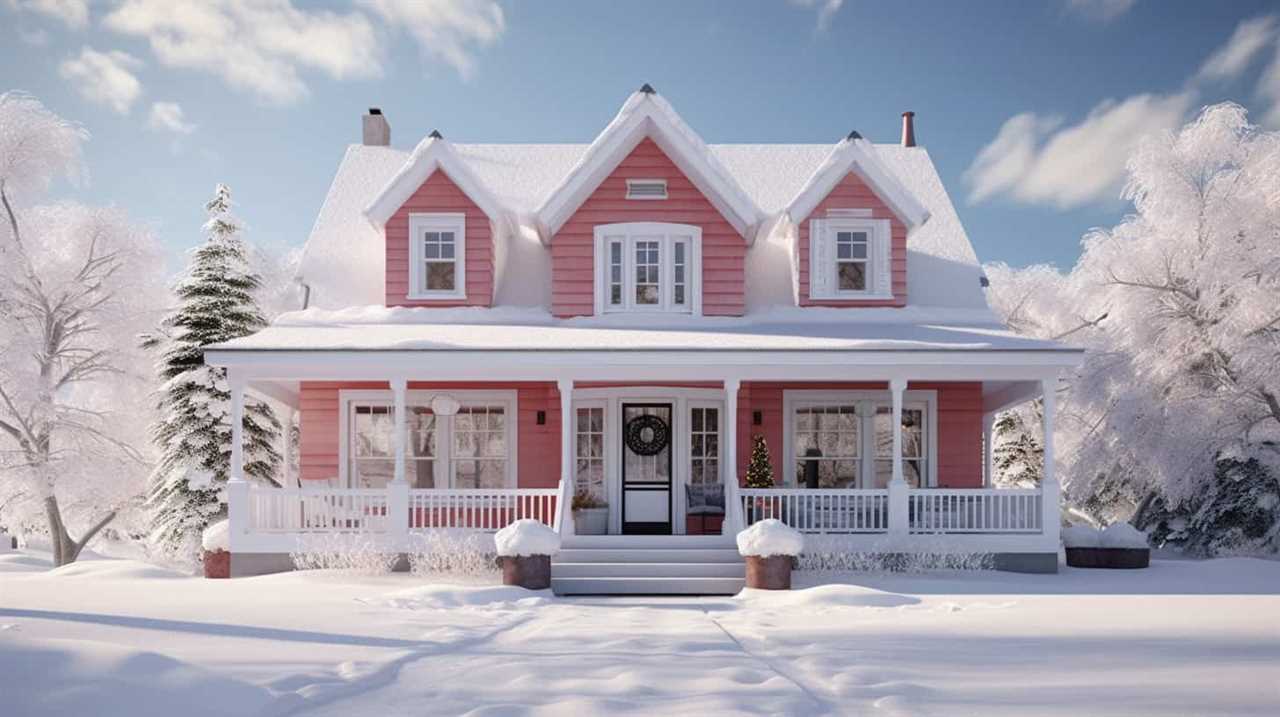
Understanding the advantages and disadvantages of traditional air conditioning systems will help us make an informed comparison with heat pumps in terms of energy efficiency.
Energy Efficiency Comparison: Heat Pump Vs Traditional AC
Let’s compare the energy efficiency of a heat pump to that of a traditional air conditioning system.
When it comes to energy savings, heat pumps are the clear winner. Heat pumps transfer heat from one location to another, rather than generating it themselves. This means they consume much less energy compared to traditional AC units that rely on electricity to cool the air.
In fact, heat pumps can provide up to 50% more energy savings than traditional AC systems.
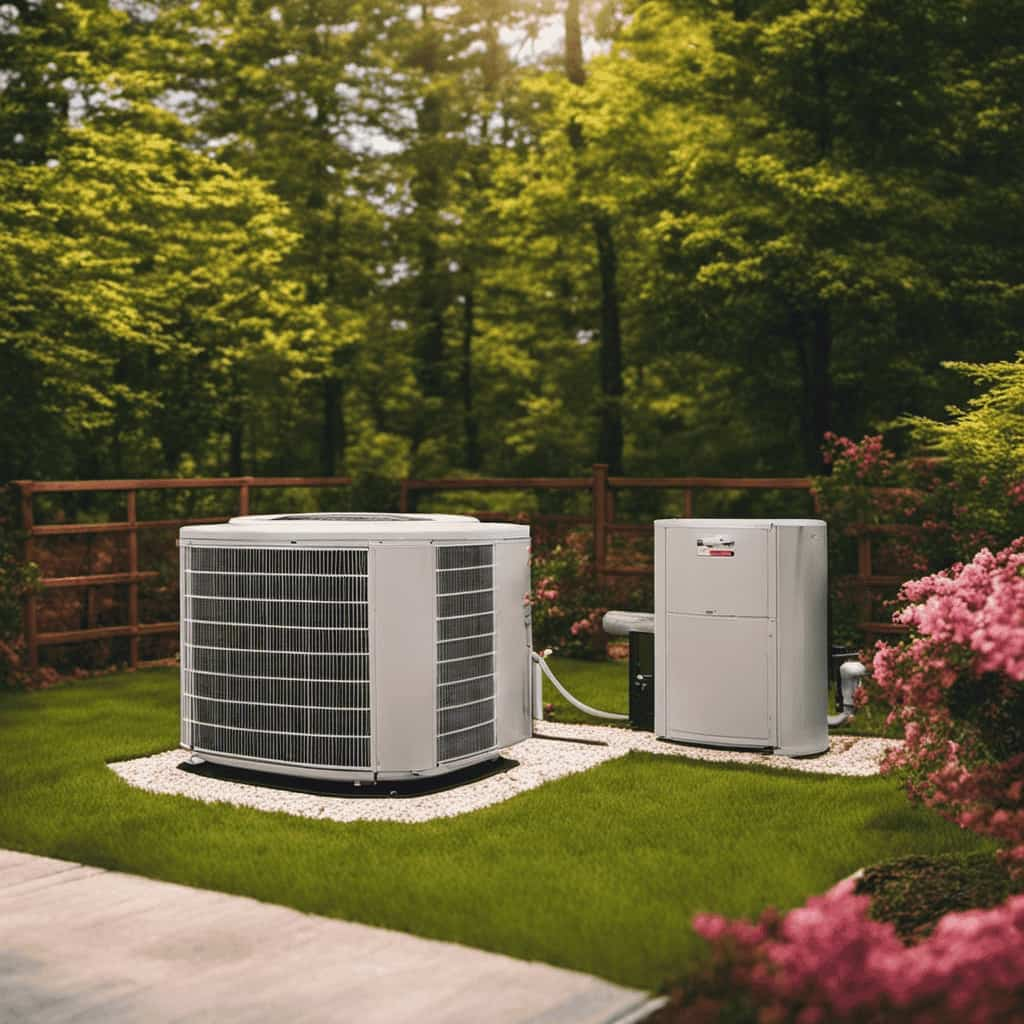
Additionally, heat pumps have a lower environmental impact. By using less energy, they reduce greenhouse gas emissions and help combat climate change.
Cost Considerations: Heat Pump Vs Traditional AC
One important factor to consider when comparing heat pumps and traditional AC systems is the cost. Here are four cost considerations to keep in mind:
-
Heat pump installation: While the initial cost of a heat pump may be higher than that of a traditional AC system, it’s important to consider the long-term savings. Heat pumps are highly efficient and can help reduce energy consumption, leading to lower utility bills over time.
-
Maintenance costs: Heat pumps typically require regular maintenance to ensure optimal performance. This can include tasks such as cleaning or replacing filters, inspecting and lubricating components, and checking refrigerant levels. It’s important to factor in these ongoing maintenance costs when considering the overall cost of a heat pump.
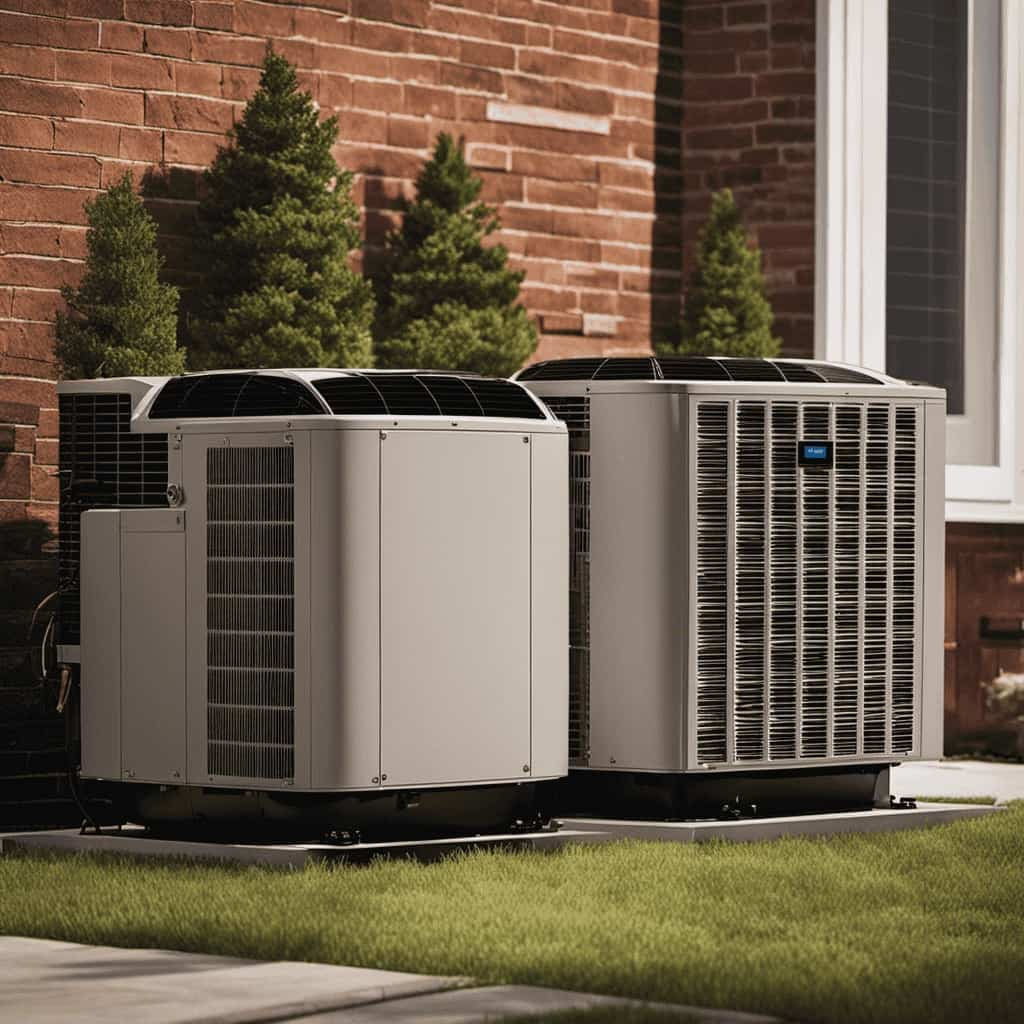
-
Potential savings: Due to their energy efficiency, heat pumps can provide significant savings on heating and cooling costs. This can help offset the initial investment and ongoing maintenance expenses, making them a cost-effective choice in the long run.
-
Rebates and incentives: Many government agencies and utility companies offer rebates and incentives for installing energy-efficient heat pumps. These financial incentives can help lower the upfront costs and make heat pumps a more affordable option.
Factors to Consider When Choosing Between a Heat Pump and Traditional AC
When deciding between a heat pump and traditional AC, there are several factors to consider.
One important factor is the installation requirements. Heat pumps require both an indoor and outdoor unit, while traditional AC systems only require an outdoor unit. This means that heat pump installation can be more complex and may require additional space.

Another factor to consider is the long term savings. Heat pumps are known for their energy efficiency, which can result in lower energy bills over time. On the other hand, traditional AC systems may have lower upfront costs but could lead to higher energy consumption and expenses in the long run.
Therefore, it’s important to weigh the installation requirements and long term savings when making a decision between a heat pump and traditional AC.
Frequently Asked Questions
Can a Heat Pump Be Used in Colder Climates With Harsh Winters?
Yes, a heat pump can be used in colder climates with harsh winters. While the efficiency of a heat pump may decrease in extreme cold, it can still provide heating. Consider the installation cost and efficiency ratings when making your decision.
How Does the Noise Level of a Heat Pump Compare to Traditional Air Conditioning Units?
When it comes to the noise level, a heat pump is generally quieter than traditional air conditioning units. This is due to the technology used in heat pumps, which prioritizes energy efficiency and reduced noise.
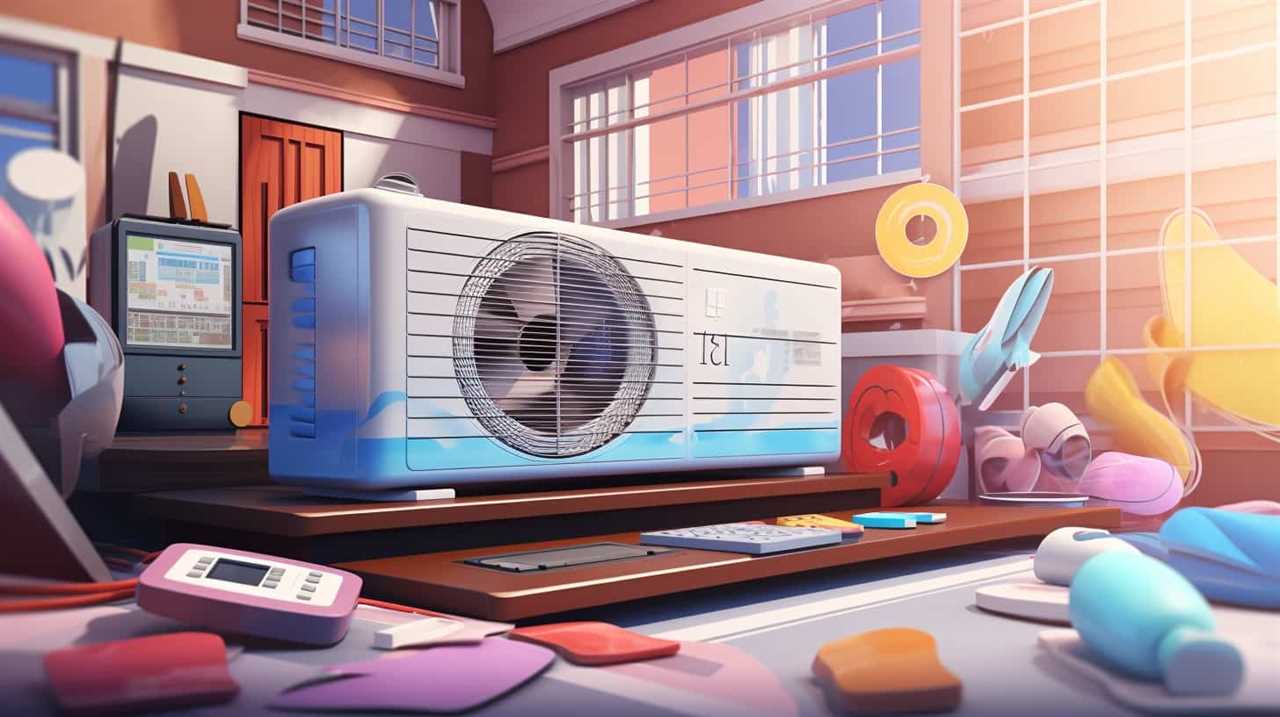
Are There Any Government Incentives or Rebates Available for Installing a Heat Pump or Traditional Air Conditioning Unit?
There are government incentives and rebates available for installing both heat pumps and traditional air conditioning units. These incentives are often based on the energy efficiency of the system and can help offset the cost of installation.
Can a Heat Pump Be Used for Both Heating and Cooling Purposes?
Yes, a heat pump can be used for both heating and cooling purposes. The efficiency of a heat pump is higher compared to a furnace for heating, making it a viable option for year-round temperature control.
What Is the Average Lifespan of a Heat Pump Compared to a Traditional Air Conditioning Unit?
The average lifespan of a heat pump is typically longer than that of a traditional air conditioning unit. Additionally, heat pumps are known for their energy efficiency, making them a popular choice for both heating and cooling purposes.
Conclusion
In conclusion, when deciding between a heat pump and traditional air conditioning, it’s essential to consider factors such as energy efficiency, cost, and personal preferences.
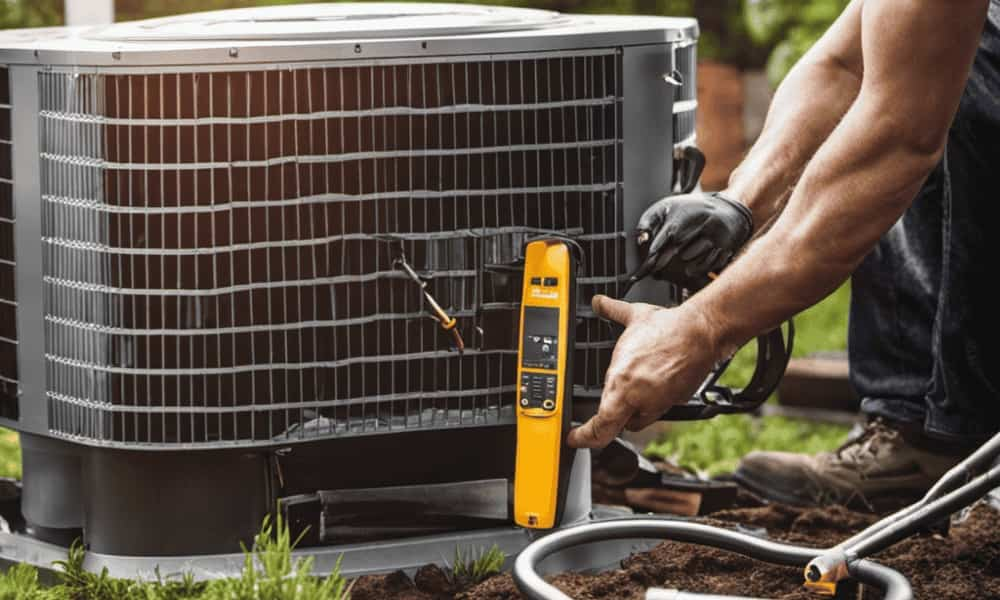
While heat pumps offer the advantage of providing both heating and cooling functions, traditional AC units may be more cost-effective in certain situations.
Ultimately, choosing the right system is like finding the perfect puzzle piece that fits seamlessly into your home’s comfort needs.
Air Conditioning
Chill Out: Unraveling Air Conditioning Heat Pump Prices

Everyone wants to stay cool during the scorching summer months, but did you know that the prices of air conditioning units can vary significantly? In fact, the costs of installation, maintenance, and repairs can add up quickly.
That’s why we’re here to help unravel the complexities and provide you with the information you need to make the best decisions for your home.
From understanding the factors that affect prices to finding affordable installation services, we’ve got you covered.
So, let’s dive in and chill out!

Key Takeaways
- Factors affecting air conditioning heat pump prices include the size and capacity of the unit, energy efficiency rating, complexity of installation, brand reputation, and manufacturer warranty.
- The cost of air conditioning heat pump installation depends on the size and complexity of the system, quality of the equipment, labor involved, and long-term benefits such as increased energy efficiency and improved comfort.
- When comparing air conditioning heat pump brands and prices, factors to consider include energy efficiency, reliability, warranty coverage, price comparison, and finding a balance between upfront cost and long-term savings.
- Hidden costs to consider when installing an air conditioning heat pump include hidden installation fees, long-term energy savings, obtaining a detailed quote from the installer, weighing hidden costs against long-term benefits, and making an informed decision.
Factors Affecting Air Conditioning Heat Pump Prices
When considering air conditioning heat pump prices, there are several factors that can affect the overall cost. Understanding these factors is crucial for finding affordable air conditioning heat pump installation services.
The size and capacity of the unit play a significant role in determining the price. Larger units with higher capacities tend to be more expensive.
Additionally, the energy efficiency rating of the heat pump impacts the cost. Units with higher efficiency ratings are typically pricier, but they can lead to long-term savings on energy bills.
The complexity of the installation process is another factor to consider. If the installation requires additional ductwork or modifications to the existing system, it can increase the overall cost.
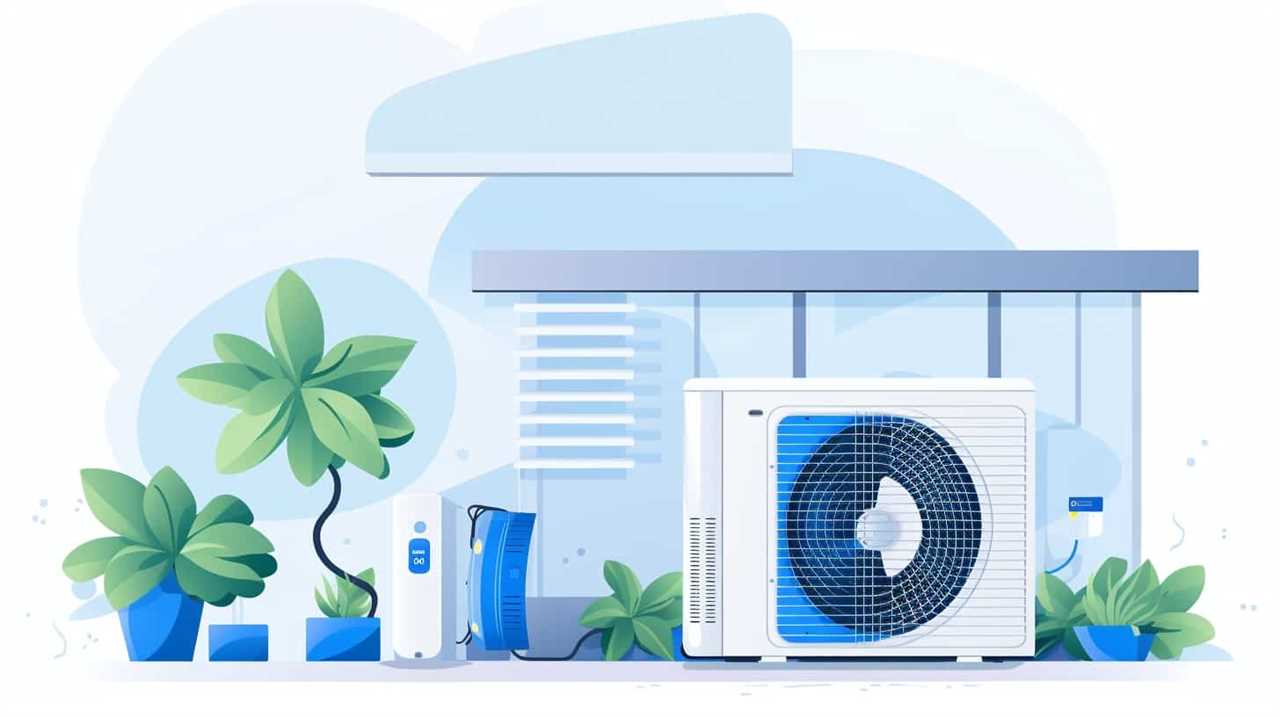
Lastly, the brand reputation and warranty offered by the manufacturer can influence the price.
Considering these factors and seeking out reputable and affordable installation services is essential for making an informed decision.
Understanding the Cost of Air Conditioning Heat Pump Installation
We have identified three key factors that contribute to the cost of air conditioning heat pump installation:
-
The size and complexity of the system: This is determined by the square footage of the area to be cooled and the number of rooms or zones that need to be controlled. A larger system or one with more advanced features will generally cost more.

-
The quality of the equipment: This also affects the price, as higher efficiency units tend to be more expensive upfront but can save on energy costs in the long run.
-
The labor involved: This includes any necessary modifications to the existing infrastructure and will contribute to the overall cost.
It’s important to consider the long-term benefits of air conditioning heat pump installation, such as increased energy efficiency and improved comfort, when evaluating the cost.
Comparing Air Conditioning Heat Pump Brands and Prices
As we compare air conditioning heat pump brands and prices, it’s important to consider factors such as energy efficiency, reliability, and warranty coverage. These factors can greatly impact the long-term cost and satisfaction of owning an air conditioning heat pump.

Here are four key considerations when comparing different brands and their prices:
-
Energy efficiency: Look for models that have a high SEER (Seasonal Energy Efficiency Ratio) rating. Higher SEER ratings indicate better energy efficiency and lower operating costs over time.
-
Reliability: Research customer reviews and ratings to determine the reliability of different brands. A reliable air conditioning heat pump will require fewer repairs and have a longer lifespan.
-
Warranty coverage: Check the warranty options offered by each brand. A comprehensive warranty can provide peace of mind and protect against unexpected repair costs.

-
Price: Compare the prices of different brands, taking into account the energy efficiency and warranty coverage. It’s important to find a balance between upfront cost and long-term savings.
Hidden Costs to Consider When Installing an Air Conditioning Heat Pump
Before making a decision, it’s important for us to be aware of the hidden costs associated with installing an air conditioning heat pump.
While the upfront price of the heat pump itself is a significant consideration, there are other expenses to keep in mind. One of these is the hidden installation fees. These fees can vary depending on factors such as the complexity of the installation, the location of the unit, and any additional work that may be required. It’s crucial to obtain a detailed quote from the installer to understand the full cost of the installation.
Another factor to consider is the long-term energy savings that can be achieved with an air conditioning heat pump. While the initial investment may be higher, the efficiency of the heat pump can lead to substantial savings on energy bills over time.

It’s essential to weigh these hidden costs against the potential long-term benefits before making a decision.
How to Budget for Air Conditioning Heat Pump Installation
When it comes to budgeting for air conditioning heat pump installation, there are a few cost-saving installation tips that can help keep expenses down.
One option is to consider financing options available, such as low-interest loans or payment plans, which can make the upfront costs more manageable.
Cost-Saving Installation Tips
We should consider three cost-saving installation tips to help us budget for air conditioning heat pump installation.

-
Choose cost-effective options: When selecting an air conditioning heat pump, consider the initial cost, as well as long-term savings. Look for models that offer energy efficiency and lower maintenance costs. Additionally, consider purchasing from reputable manufacturers that offer warranties and after-sales support.
-
Optimize installation location: Proper placement of the heat pump can significantly impact its efficiency and overall performance. Ensure that the unit is installed in a shaded area to reduce the load on the system and prevent unnecessary strain. Additionally, avoid areas with high humidity or excessive dust accumulation, as this can affect the heat pump’s longevity.
-
Seek professional installation services: Hiring a professional for installation ensures that the process is done correctly, minimizing the risk of errors or damage. They can also provide expert advice on optimizing the system’s performance and efficiency.
Financing Options Available
Let’s explore the financing options available to help us budget for air conditioning heat pump installation.
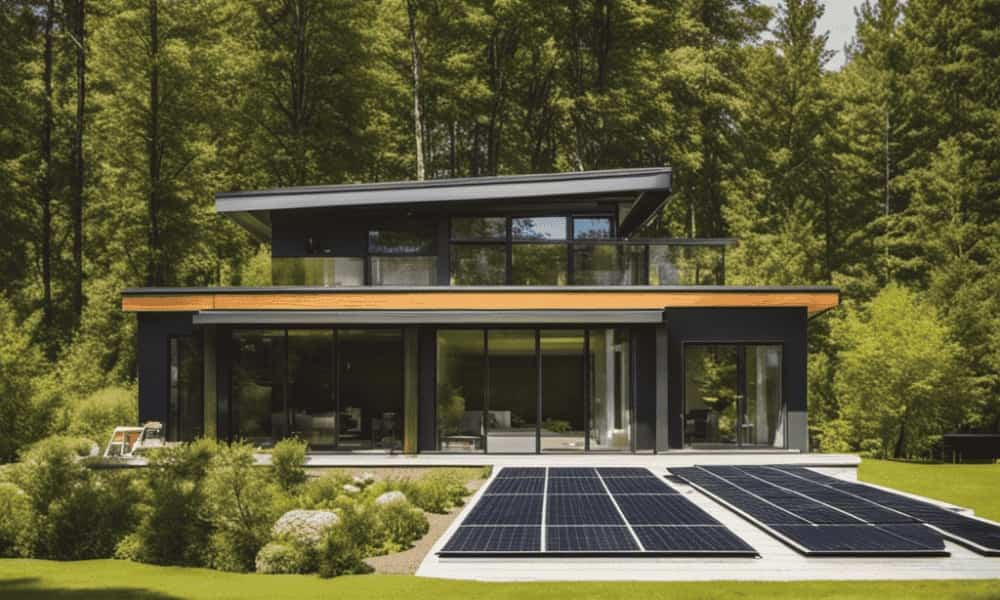
When it comes to paying for the installation of an air conditioning heat pump, there are several payment options to consider. Many HVAC companies offer financing programs that allow customers to spread the cost of the installation over a period of time. These programs often come with competitive interest rates, making it more affordable for homeowners to invest in a new system. Some financing options may even offer promotional periods with low or zero interest rates, providing additional savings.
By utilizing these payment options, homeowners can better manage their budgets and avoid the upfront costs of installation.
Now that we understand the financing options available, let’s move on to the next section where we’ll discuss tips for finding affordable air conditioning heat pump installation services.
Tips for Finding Affordable Air Conditioning Heat Pump Installation Services
Finding affordable air conditioning heat pump installation services can be a challenge. When searching for the best installation services at a reasonable price, consider the following tips:

-
Compare quotes from multiple service providers: Request quotes from different installation companies to compare prices and services offered. This will help you find the most affordable option that meets your requirements.
-
Seek recommendations: Ask friends, family, or neighbors who’ve recently installed air conditioning heat pumps for recommendations on affordable and reliable installation services.
-
Look for special offers or discounts: Keep an eye out for special promotions or discounts offered by installation companies. These can provide an opportunity to save money on the installation cost.
-
Consider DIY installation: If you have the necessary skills and knowledge, opting for a DIY installation can save you a significant amount of money. However, ensure that you’re confident in your abilities before attempting this option.

Financing Options for Air Conditioning Heat Pump Installation
When it comes to financing options for air conditioning heat pump installation, there are two main choices to consider: obtaining a loan or leasing the equipment. Both options have their pros and cons, and it’s important to carefully evaluate them based on your specific circumstances.
Additionally, credit requirements may vary depending on the financing option you choose, so it’s crucial to check your credit score and history beforehand.
Lastly, it’s worth exploring the payment plans offered by different lenders or leasing companies to find one that aligns with your budget and preferences.
Loan Vs. Lease
We’ve compared the pros and cons of loan and lease options to finance the installation of an air conditioning heat pump. Here’s a breakdown of each option:
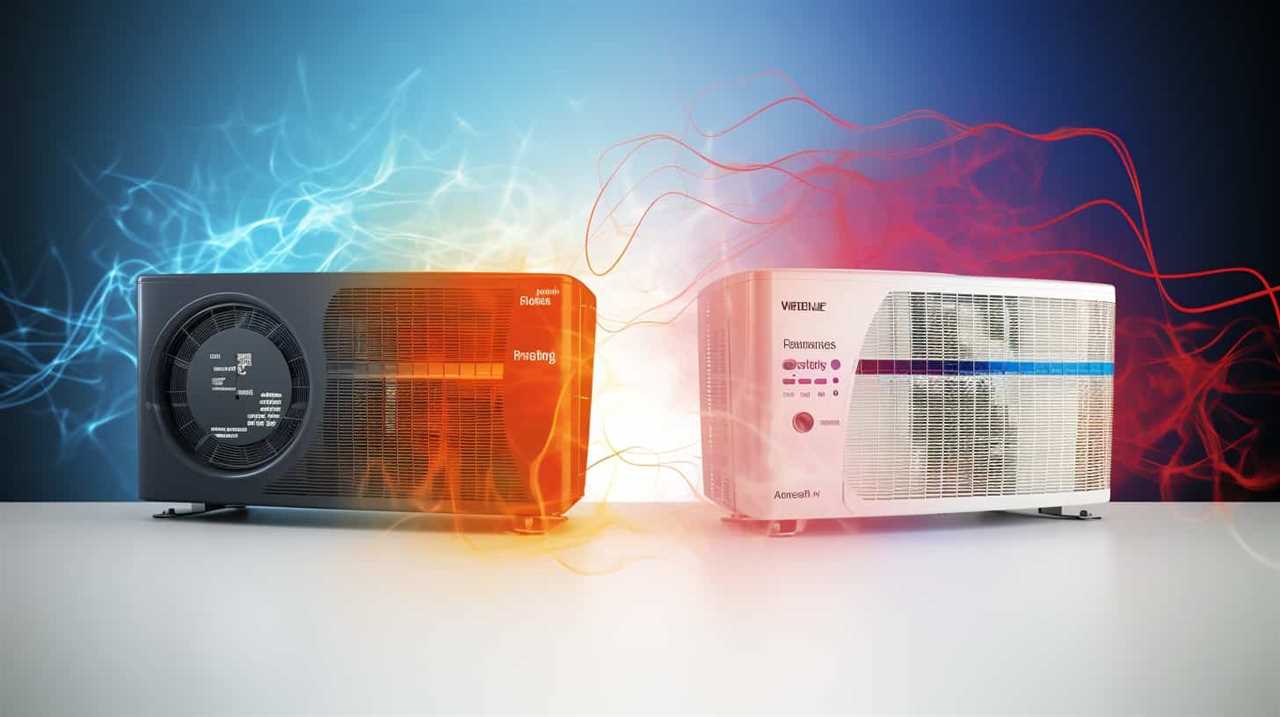
-
Loan options: Taking out a loan allows you to own the heat pump outright. With a loan, you make monthly payments towards the principal and interest. This option gives you the flexibility to choose the loan term and interest rate that best fits your budget.
-
Lease agreements: Leasing a heat pump means you don’t own it, but you have the right to use it for a specified period. Lease agreements typically come with lower upfront costs and maintenance responsibilities. However, you won’t build equity in the equipment and may have restrictions on customization.
-
Flexibility: Loans offer more flexibility in terms of equipment choices and customization options. With a lease, you may have limited options for equipment selection and modifications.
-
Long-term costs: While loans may have higher upfront costs, in the long run, you’ll own the equipment and benefit from reduced energy bills. Leases may have lower upfront costs, but you’ll have ongoing monthly payments and may not experience the same energy savings.

Considering the pros and cons of loan and lease options, it’s important to evaluate your financial situation and long-term goals before making a decision.
Now, let’s dive into the credit requirements for financing an air conditioning heat pump installation.
Credit Requirements
To finance the installation of an air conditioning heat pump, our credit requirements and available financing options must be considered. When it comes to credit requirements, lenders typically evaluate factors such as credit score, income, and debt-to-income ratio. A good credit score and stable income will increase your chances of securing favorable financing options for your air conditioning heat pump installation. Speaking of financing options, let’s take a look at the table below to understand the different options available:
| Financing Option | Description | Pros |
|---|---|---|
| Personal Loan | A loan obtained from a bank or credit union for the specific purpose of financing your air conditioning heat pump installation. | Flexible repayment terms, lower interest rates compared to credit cards. |
| Manufacturer Financing | Financing options offered by the manufacturer of the air conditioning heat pump. | Special promotions or discounts, may have more lenient credit requirements. |
| Home Equity Loan | A loan that allows you to borrow against the equity in your home. | Potentially tax-deductible interest, longer repayment terms. |
Payment Plans Offered
By exploring the available financing options, we can find payment plans that suit our budget for air conditioning heat pump installation. Here are four financing options to consider:

-
Traditional Bank Loan: This option allows us to borrow a specific amount of money from a bank to finance our air conditioning heat pump installation. We’ll need to repay the loan over a fixed period of time with interest.
-
Manufacturer Financing: Some air conditioning heat pump manufacturers offer financing options directly to customers. These financing plans may come with competitive interest rates and flexible repayment terms.
-
Lease-to-Own: With a lease-to-own option, we can lease the air conditioning heat pump and have the option to purchase it at the end of the lease term. This option may be beneficial for those who prefer lower monthly payments initially.
-
Home Equity Line of Credit (HELOC): If we’ve equity in our home, we can use a HELOC to finance our air conditioning heat pump installation. This option allows us to borrow against the equity in our home and typically offers lower interest rates than other financing options.

Saving Money on Air Conditioning Heat Pump Maintenance and Repairs
Our best strategy for saving money on air conditioning heat pump maintenance and repairs is to perform regular inspections and cleanings. By conducting routine inspections, we can identify any potential issues early on and address them before they become major problems. This can help prevent costly repairs down the line.
Additionally, regular cleanings of the air conditioning heat pump can improve its efficiency and prolong its lifespan. Cleaning the coils, filters, and condensate drain can ensure that the heat pump operates at its optimal level, reducing energy consumption and saving money on utility bills.
It’s also important to check and tighten any loose electrical connections, as they can lead to performance issues or even system failure. Following these maintenance tips can help homeowners save money and keep their air conditioning heat pumps running smoothly.
Frequently Asked Questions
Are There Any Government Incentives or Tax Credits Available for Purchasing and Installing an Air Conditioning Heat Pump?
Yes, there are government incentives and tax credits available for purchasing and installing an air conditioning heat pump. These include government tax incentives and energy efficiency rebates that can help offset the cost of the system.
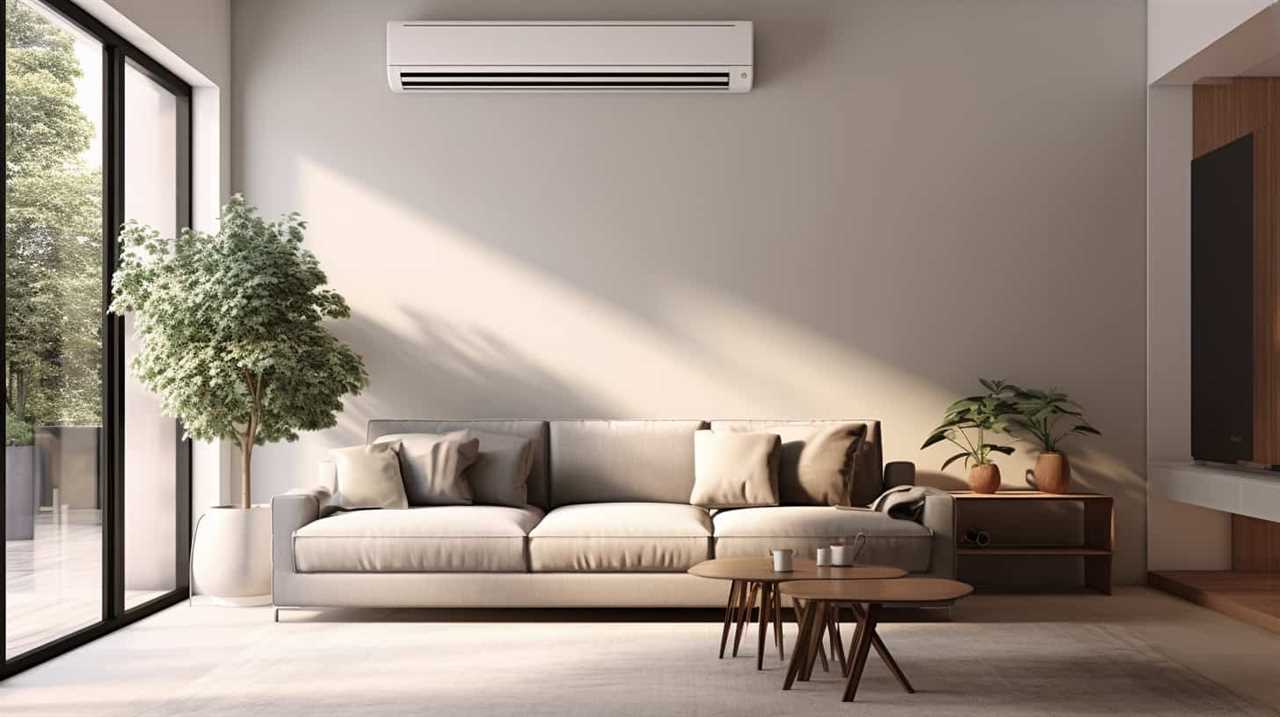
What Is the Average Lifespan of an Air Conditioning Heat Pump?
The average lifespan of an air conditioning heat pump can vary, but it is typically around 15-20 years. Regular maintenance, such as cleaning the filters and coils, can help prolong its lifespan.
Can I Install an Air Conditioning Heat Pump Myself, or Is Professional Installation Required?
We can choose to install an air conditioning heat pump ourselves, but professional installation is recommended. DIY installation may save money, but professional installation ensures proper setup and performance, minimizing potential risks and maximizing efficiency.
How Can I Determine the Right Size Air Conditioning Heat Pump for My Home?
To determine the right size air conditioning heat pump for our home, we need to consider factors such as square footage, insulation, and climate. Proper sizing ensures optimal performance and energy efficiency, resulting in lower maintenance costs and greater comfort.
Are There Any Energy-Saving Features or Technologies That I Should Look for When Choosing an Air Conditioning Heat Pump?
When choosing an air conditioning heat pump, it’s important to consider energy-efficient technologies and the benefits of smart thermostats. These features can help reduce energy consumption and lower utility bills.

Conclusion
In conclusion, if you want to unravel the mysterious world of air conditioning heat pump prices, just take a chill pill.
While the cost of installation and maintenance may cause some sweat to form on your brow, there are ways to keep your cool.
By understanding the factors that affect prices, comparing brands, and considering hidden costs, you can budget wisely and find affordable installation services.
So don’t let the heat get to you, stay cool and save some cash!
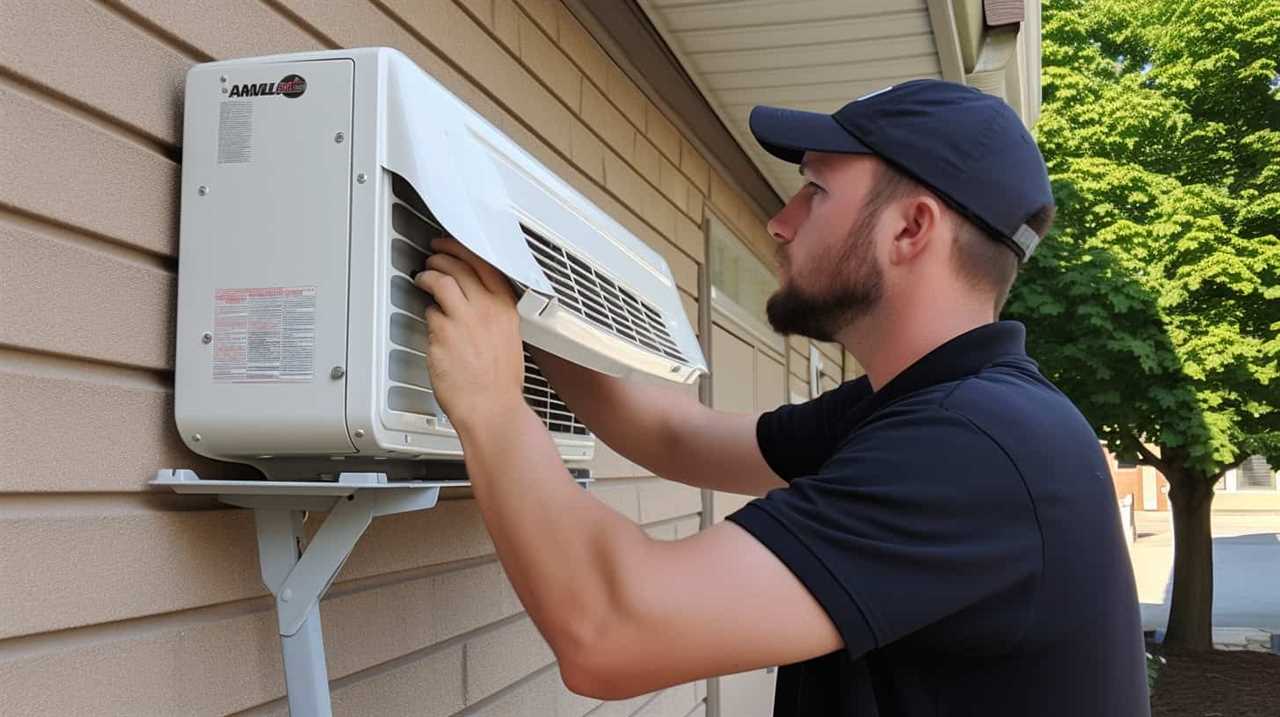
Air Conditioning
What Are the Top Energy-Efficient Heat Pump Acs

We have found the top energy-efficient heat pump air conditioners that are revolutionizing the way we cool our homes.
Did you know that these advanced units can reduce energy consumption by up to 50% compared to traditional air conditioners?
In this article, we’ll explore the top brands in the market and share essential factors to consider when choosing an energy-efficient heat pump AC.
Get ready to embrace innovation and maximize your cooling efficiency with these cutting-edge systems.
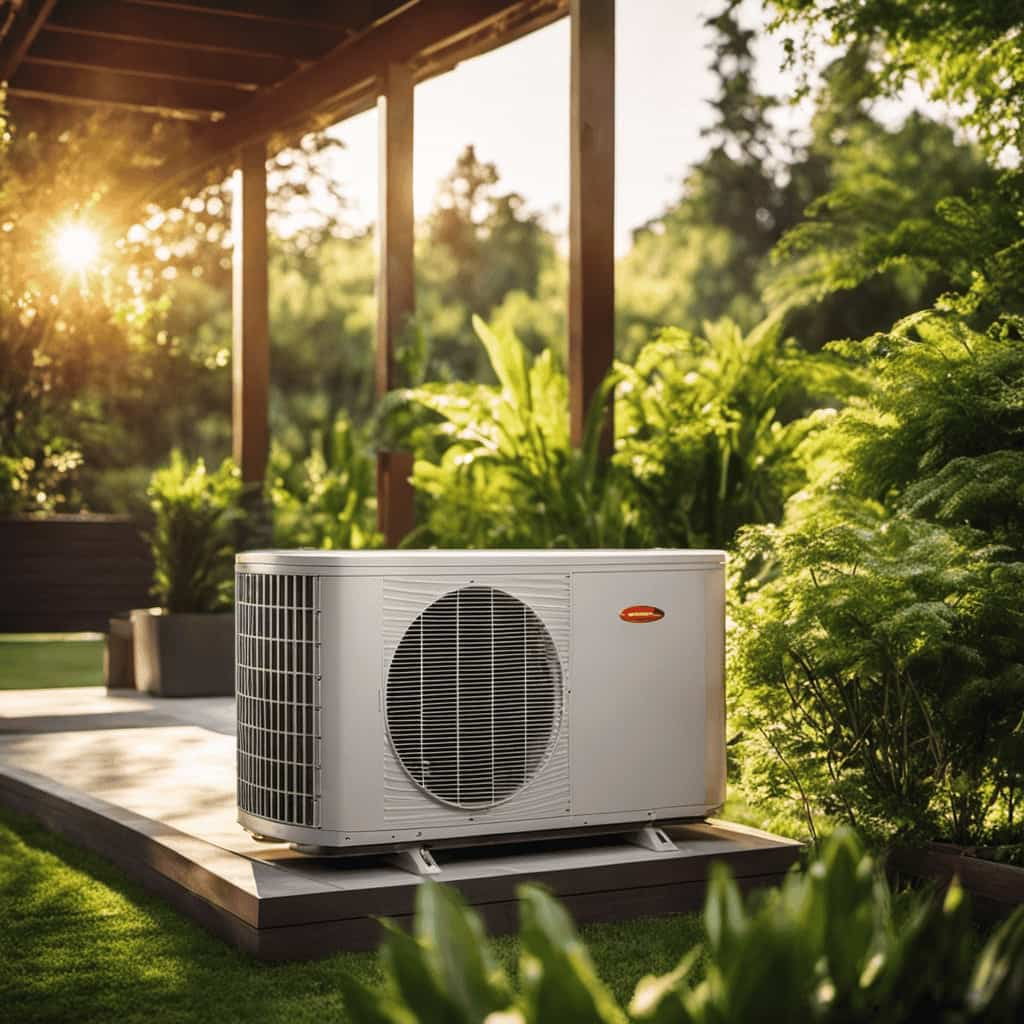
Key Takeaways
- Energy-Efficient Heat Pump ACs can reduce energy consumption by up to 50% compared to traditional air conditioners, leading to significant savings on electricity bills.
- The SEER rating of a heat pump AC is an important factor to consider, as higher SEER ratings indicate greater energy efficiency.
- It is crucial to choose the right size heat pump AC for optimal energy efficiency, avoiding units that are either too small or oversized.
- Trane and Carrier are top brands in the market that offer reliable and sustainable cooling and heating solutions, prioritizing innovation and efficiency.
Benefits of Energy-Efficient Heat Pump ACs
We love energy-efficient heat pump ACs because they save us money on our electricity bills. These advanced systems utilize cutting-edge energy-saving technology, allowing us to reduce our energy consumption without sacrificing comfort.
By using less electricity, we can significantly lower our monthly utility costs, resulting in substantial long-term cost savings. Energy-efficient heat pump ACs are designed to operate at optimal efficiency levels, maximizing the cooling and heating output while minimizing energy waste.
This innovative technology not only benefits our wallets but also helps protect the environment by reducing our carbon footprint.
When considering the purchase of an energy-efficient heat pump AC, it’s crucial to evaluate factors such as energy efficiency ratings, capacity, and compatibility with our home’s existing HVAC system. Making an informed decision ensures that we can fully enjoy the benefits of energy-efficient cooling and heating while maximizing our cost savings.
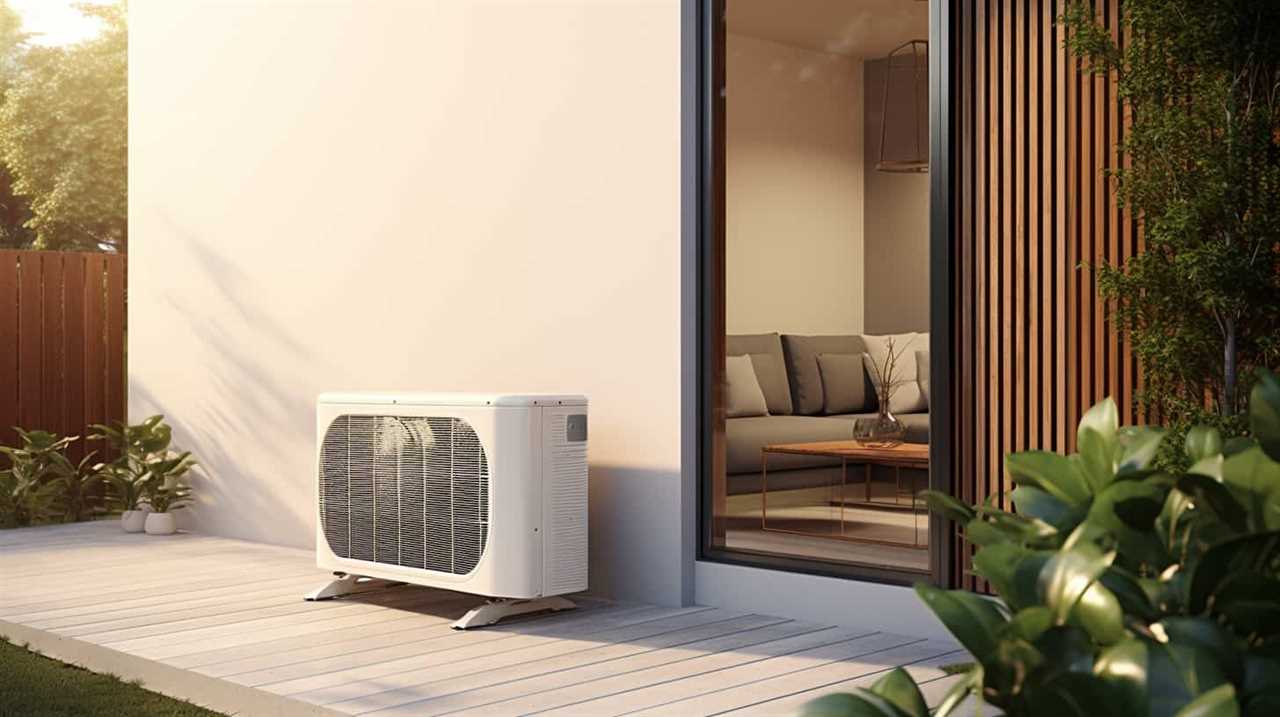
Factors to Consider When Choosing an Energy-Efficient Heat Pump AC
Two key factors to consider when choosing an energy-efficient heat pump AC are the SEER rating and the size of the unit.
-
SEER rating: The Seasonal Energy Efficiency Ratio (SEER) measures the cooling efficiency of an AC unit. Higher SEER ratings indicate greater energy efficiency, resulting in lower energy consumption and cost savings over time. Look for units with SEER ratings of 14 or higher for optimal energy efficiency.
-
Size of the unit: Choosing the right size is crucial for energy efficiency. A unit that’s too small will struggle to cool the space efficiently, while an oversized unit will cycle on and off frequently, wasting energy. It’s important to have a professional assess the cooling needs of your space and recommend the appropriate size.
Considering these factors won’t only ensure cost-effective options for energy-efficient heat pump ACs but also minimize the environmental impact of your cooling system.

Top Energy-Efficient Heat Pump AC Brands in the Market
Among the top energy-efficient heat pump AC brands in the market, Trane and Carrier stand out for their innovative technology and high-performance units. These brands offer a range of top rated heat pump AC models that provide both efficient cooling and heating, making them a cost effective heat pump AC option for consumers. Trane is known for its advanced ComfortLink™ II communicating technology, which allows the system components to automatically communicate and optimize performance. Carrier, on the other hand, offers the Infinity® Series heat pumps that deliver precise temperature control and enhanced energy efficiency. Both brands prioritize innovation and efficiency to provide customers with reliable and sustainable cooling and heating solutions.
| Brand | Technology | Energy Efficiency |
|---|---|---|
| Trane | ComfortLink™ II | High |
| Carrier | Infinity® Series | High |
Table 1: Comparison of Energy-Efficient Heat Pump AC Brands
These top energy-efficient heat pump AC brands offer cutting-edge technology and high energy efficiency ratings, making them a smart choice for consumers seeking innovative cooling and heating solutions.
Features to Look for in an Energy-Efficient Heat Pump AC
Our focus now shifts to the features to look for in an energy-efficient heat pump AC. When searching for the perfect unit, keep these key features in mind:
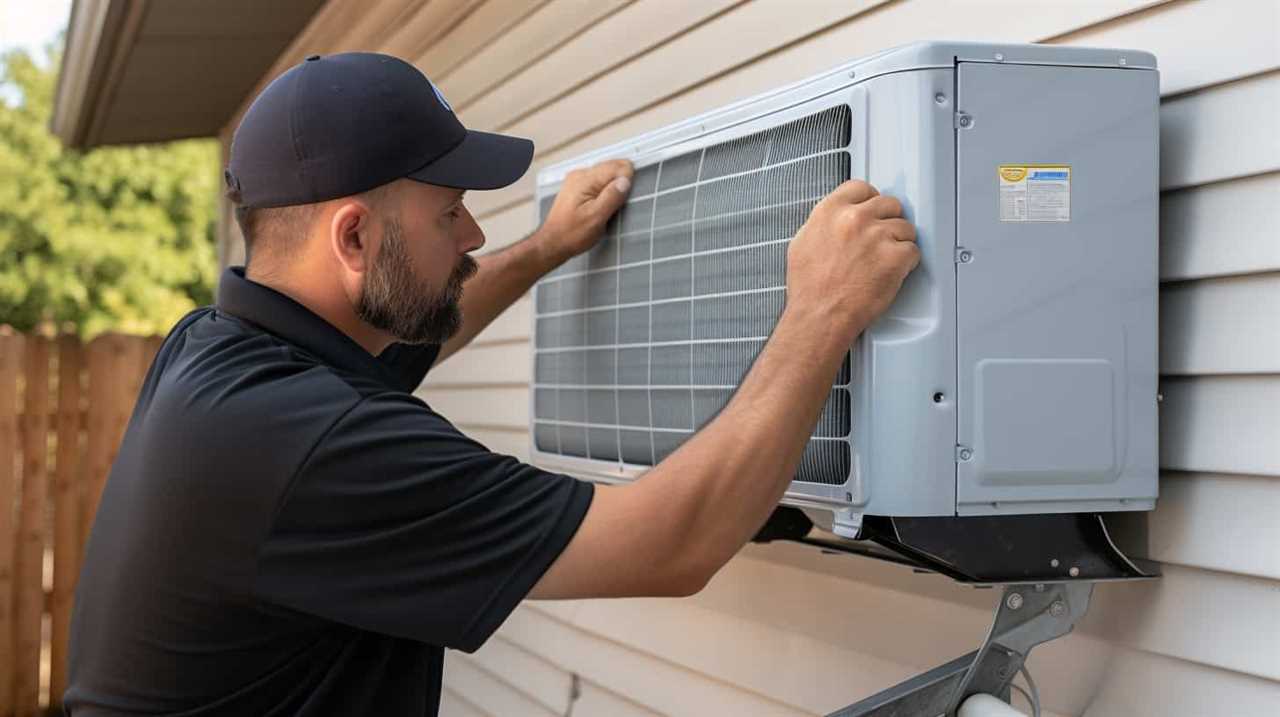
-
Energy-saving technology: Look for heat pump ACs that utilize advanced energy-saving technology. This can include features like variable speed compressors, which adjust the cooling output to match the specific needs of your home, resulting in reduced energy consumption.
-
Cost-effective cooling: Opt for a heat pump AC that offers cost-effective cooling. Look for units with high energy efficiency ratios (EER) and seasonal energy efficiency ratios (SEER), as these indicate how efficiently the unit can cool your space while minimizing energy usage and costs.
-
Smart thermostat compatibility: Consider heat pump ACs that are compatible with smart thermostats. This allows you to easily control and monitor your cooling system remotely, optimizing energy usage and comfort levels.
-
Zoning capabilities: Look for units that offer zoning capabilities, allowing you to independently control the temperature in different areas of your home. This feature ensures that you only cool the areas that need it, saving energy and reducing costs.

Tips for Maximizing Energy Efficiency With Heat Pump ACs
To maximize energy efficiency with heat pump ACs, we can follow these tips.
-
Utilize energy-saving techniques such as setting the thermostat to a moderate temperature and using the ‘energy saver’ mode. This reduces the workload on the heat pump and saves energy.
-
Ensure proper maintenance of the heat pump AC. Regularly clean or replace the air filters to improve airflow and system efficiency. Keep the outdoor unit clear of debris and vegetation to optimize heat exchange.
-
Additionally, schedule professional maintenance at least once a year to check for refrigerant leaks, inspect electrical connections, and calibrate the system.
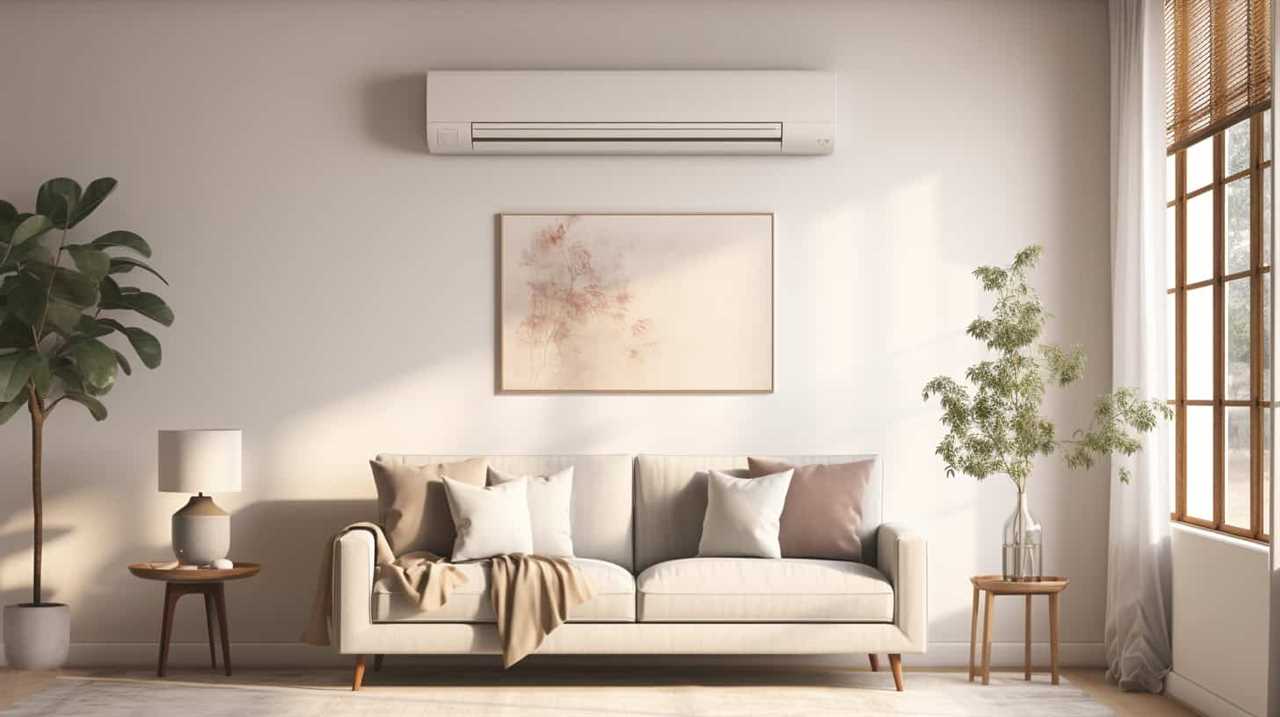
Frequently Asked Questions
How Much Money Can I Expect to Save on My Energy Bills by Using an Energy-Efficient Heat Pump Ac?
By using an energy-efficient heat pump AC instead of a traditional AC, we can expect to save a significant amount of money on our energy bills. The benefits of an energy-efficient heat pump AC include increased efficiency and reduced energy consumption.
Are There Any Tax Incentives or Rebates Available for Purchasing an Energy-Efficient Heat Pump Ac?
Yes, there are tax incentives and rebates available for purchasing an energy-efficient heat pump AC. These incentives can help offset the initial cost and encourage energy savings in the long run.
Can I Use an Energy-Efficient Heat Pump AC in Colder Climates?
Yes, you can use energy-efficient heat pump ACs in colder climates. They have the advantage of providing both cooling and heating, making them suitable for regions with varying temperatures.
How Long Does an Energy-Efficient Heat Pump AC Typically Last?
Heat pump ACs typically last for around 15-20 years. However, with proper maintenance, they can surpass this range. Regular maintenance can also help reduce the overall maintenance cost and ensure their longevity.
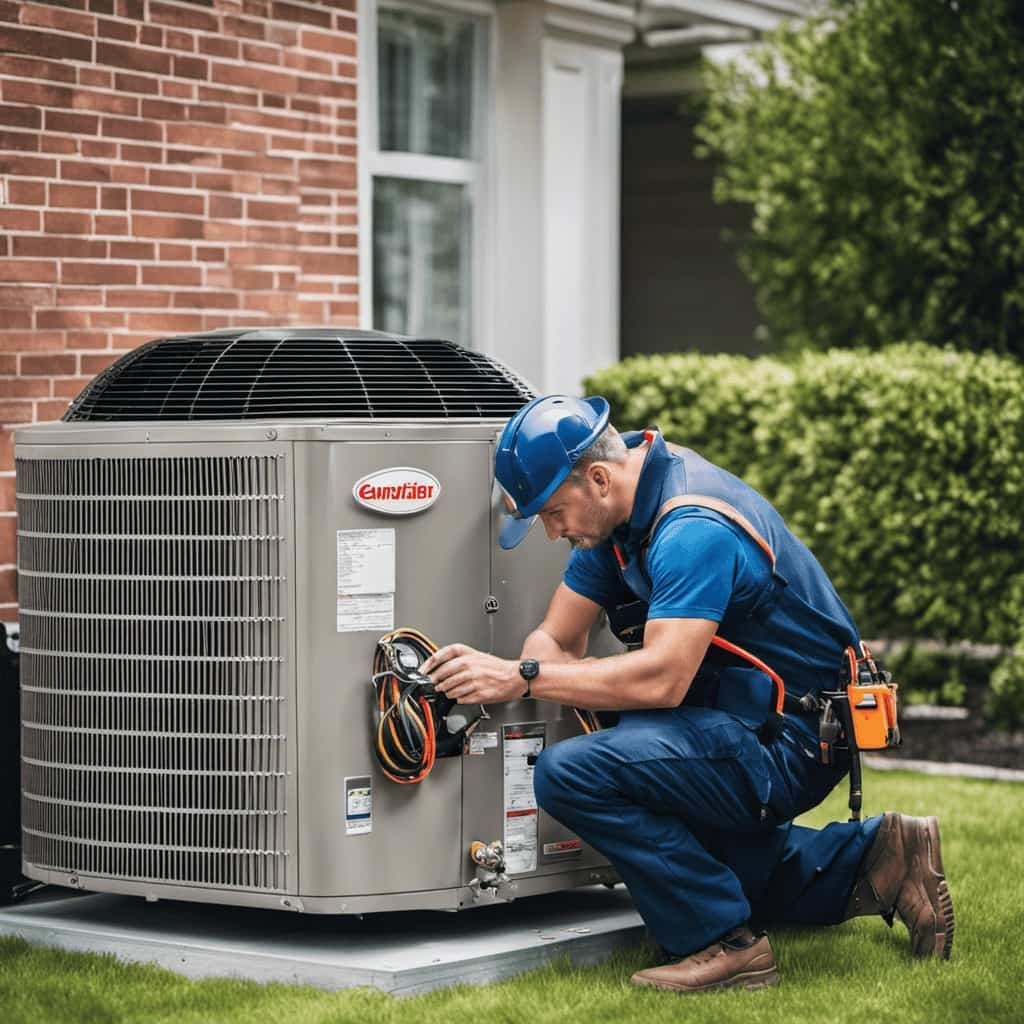
Are There Any Maintenance Requirements for Energy-Efficient Heat Pump Acs?
There are maintenance requirements for energy-efficient heat pump ACs. Regular filter cleaning, coil inspection, and refrigerant level checks are necessary to ensure optimal performance and maximize the benefits of these innovative systems.
Conclusion
In conclusion, choosing an energy-efficient heat pump AC can significantly reduce energy consumption and lower utility bills. By investing in top brands and considering important factors such as SEER ratings and size, consumers can make a smart choice.
Features like programmable thermostats and variable speed compressors further enhance the efficiency of these systems. By following tips for maximizing energy efficiency, individuals can create a comfortable and eco-friendly living space while saving money in the long run.
Air Conditioning
Your Guide: Installing a Heat Pump for AC
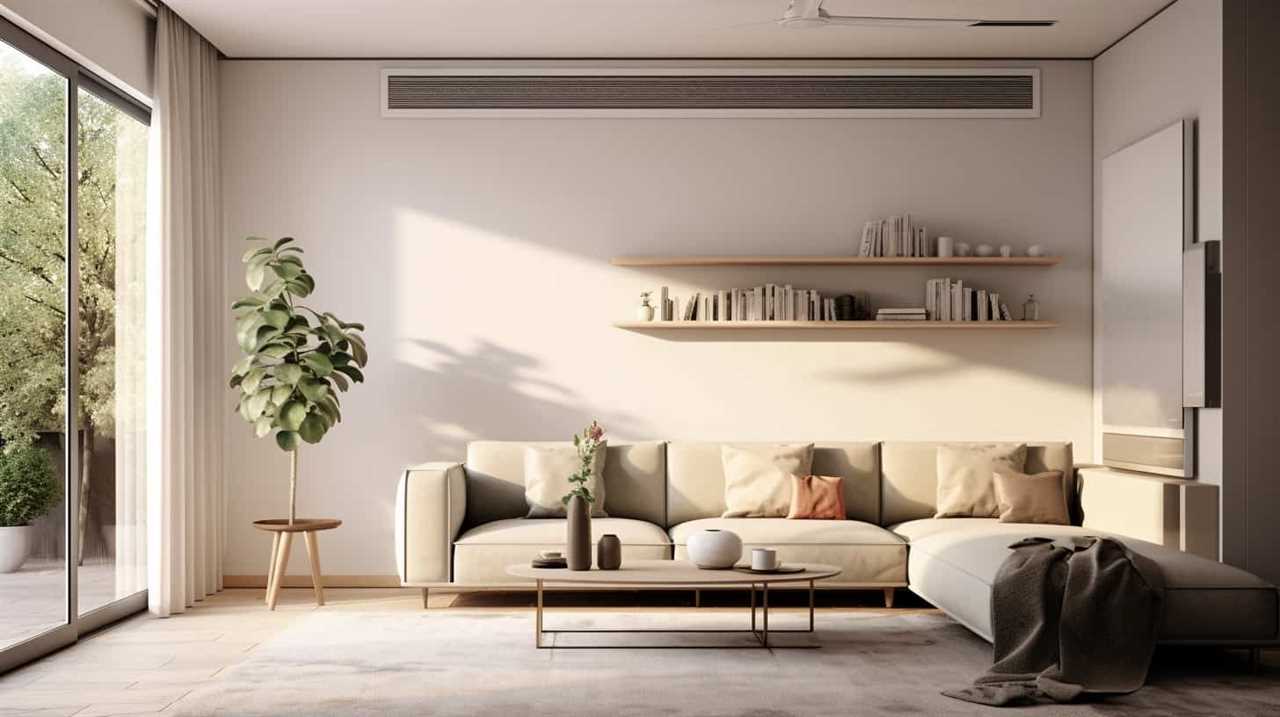
Are you looking for a way to beat the heat this summer and save on your energy costs? Interested in learning about installing a heat pump for air conditioning? Look no further, as we have the ultimate guide for you here.
Are you ready to revolutionize your cooling system? With our step-by-step process and expert tips, you’ll be well on your way to a more efficient and comfortable home.
Let’s dive in and discover the ins and outs of heat pump installation!
Key Takeaways
- Heat pumps transfer heat from one location to another and can provide both heating and cooling.
- Assessing the home’s cooling needs involves considering factors such as size, insulation, and climate, as well as evaluating the efficiency and maintenance requirements of heat pumps.
- Choosing the right heat pump size is important to ensure energy efficiency and minimize maintenance issues.
- Preparing the home for heat pump installation involves gathering necessary tools and materials, addressing insulation requirements, meeting electrical requirements, and preparing the outdoor area for installation.
Understanding Heat Pumps: A Brief Overview
Let’s start by understanding how heat pumps work and their key components. Heat pumps are innovative systems that use a small amount of energy to transfer heat from one location to another. They work by extracting heat from the air or ground outside your home and transferring it indoors during the colder months. In the summer, the process is reversed, and heat is extracted from the indoor air and released outside, providing cooling. This efficient mechanism allows heat pumps to provide both heating and cooling, making them versatile and cost-effective.
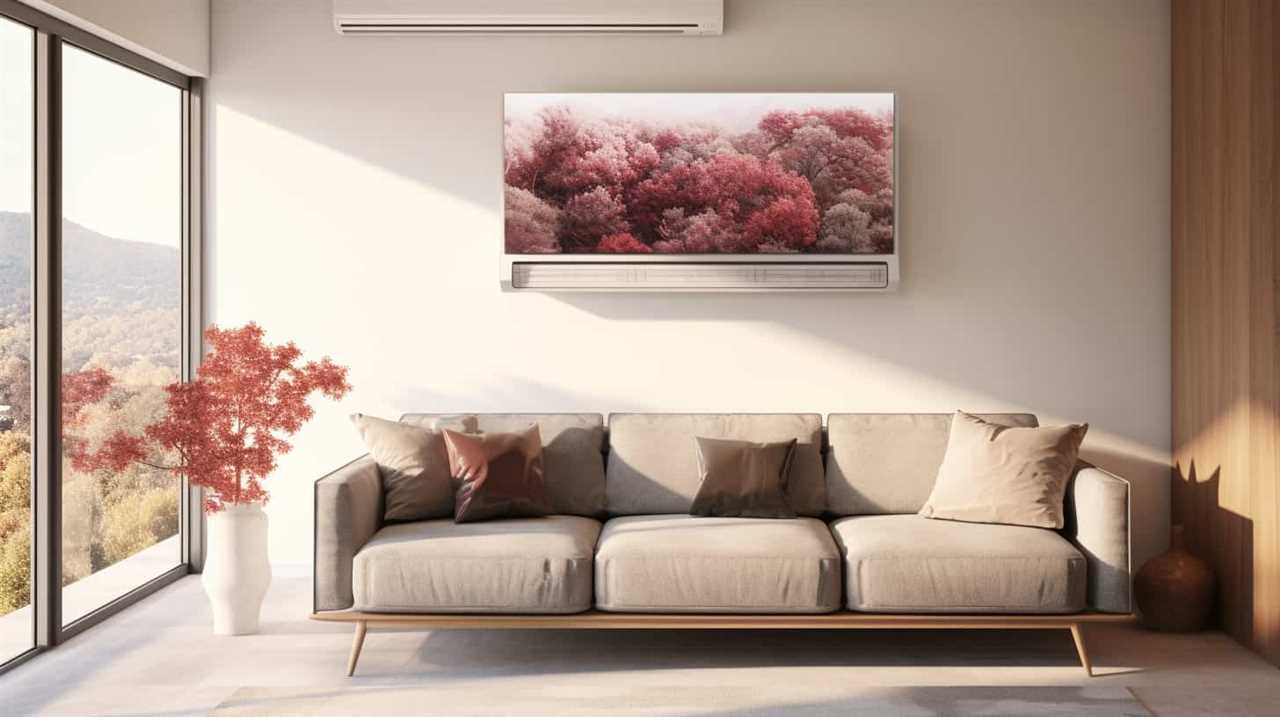
The benefits of heat pumps include energy efficiency, lower utility bills, and reduced environmental impact. Now that we’ve a basic understanding of heat pump mechanics and their advantages, let’s move on to assessing your home’s cooling needs.
Assessing Your Home’s Cooling Needs
To accurately determine our home’s cooling needs, we need to consider factors such as the size of our space, insulation levels, and the climate we live in.
Evaluating the efficiency of a heat pump is crucial in determining its ability to effectively cool our home. Heat pumps with higher Seasonal Energy Efficiency Ratios (SEER) are more efficient and can provide greater energy savings.
Additionally, we should also assess the maintenance requirements of the heat pump. Some models may require regular filter changes or annual professional maintenance to ensure optimal performance.
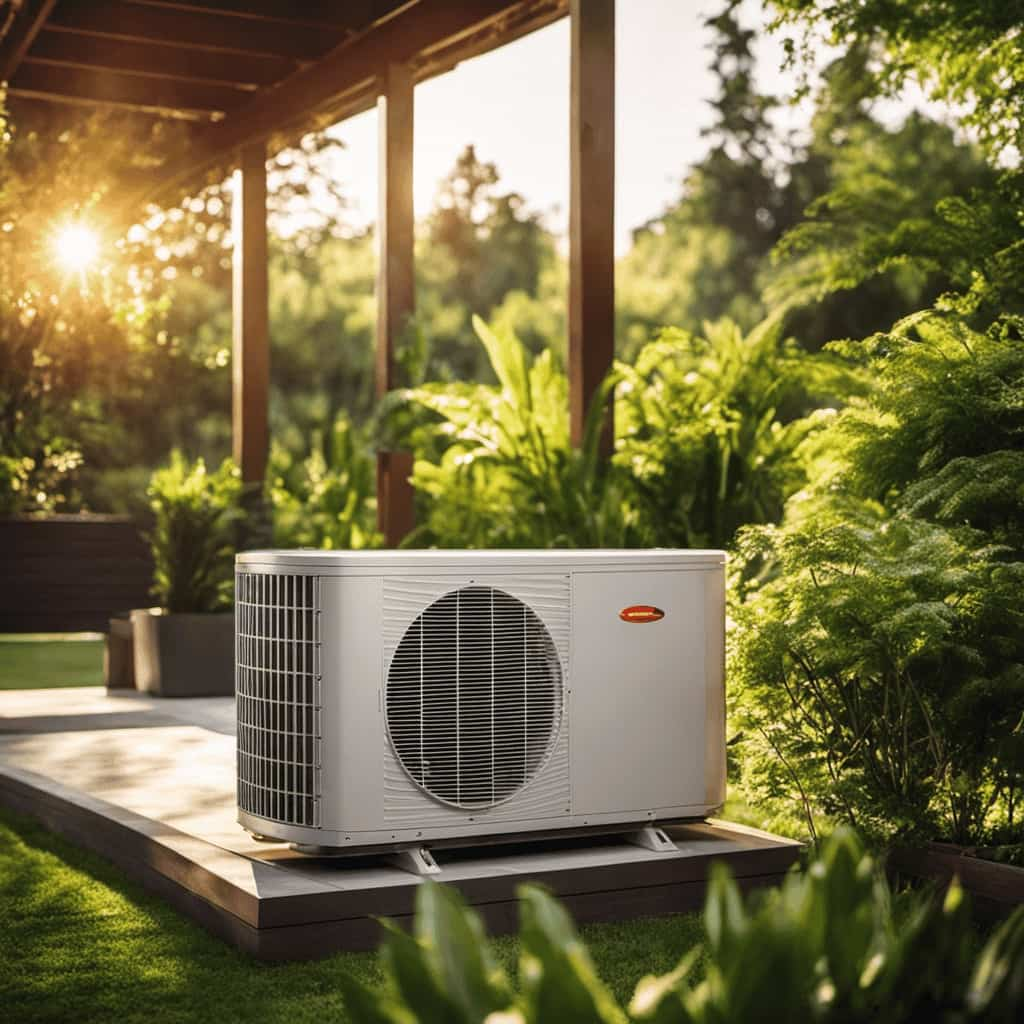
By evaluating these factors, we can choose a heat pump that meets our cooling needs while maximizing efficiency and minimizing maintenance requirements.
This will ensure a comfortable and cost-effective cooling solution for our home.
Choosing the Right Heat Pump Size
Determining the appropriate heat pump size involves calculating the square footage of our home and considering factors such as insulation, climate, and desired temperature. To ensure optimal heat pump efficiency, it’s crucial to choose a size that matches our specific cooling needs.
Oversized units can lead to frequent on-off cycling, causing unnecessary wear and tear on the system and reducing its lifespan. On the other hand, undersized units may struggle to cool the space efficiently, resulting in inadequate comfort and increased energy consumption.
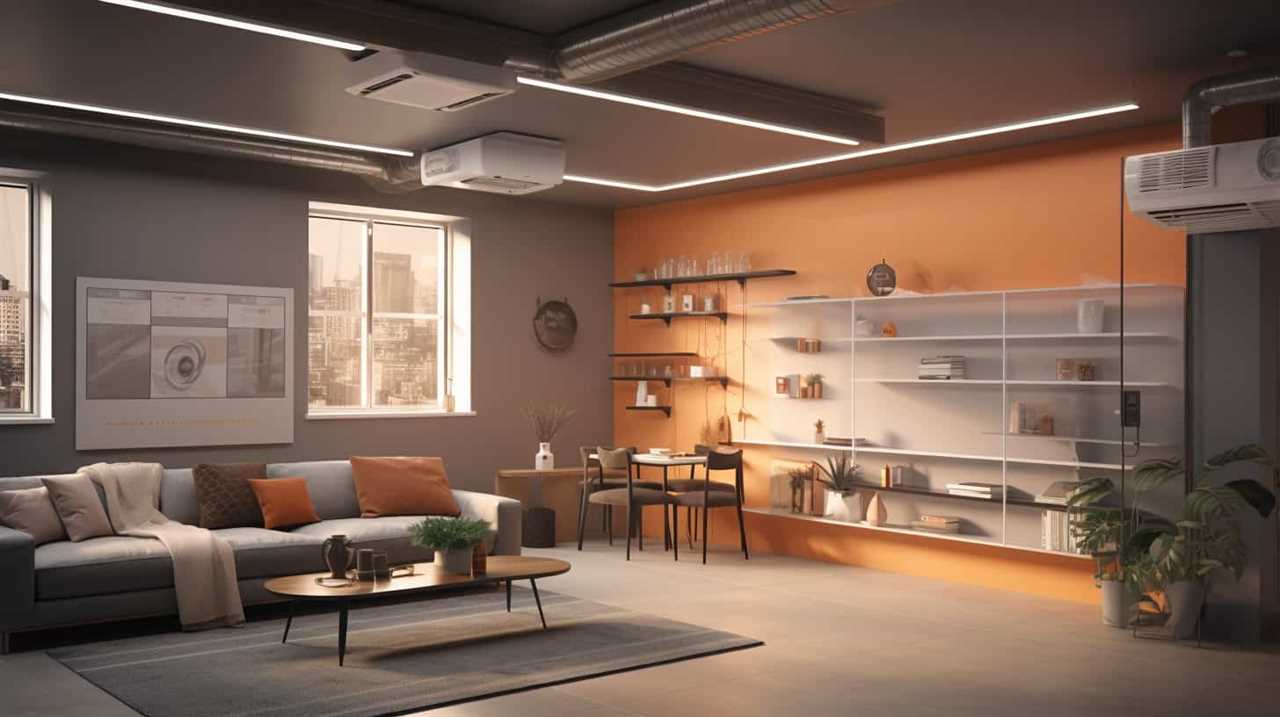
To find the right size, we can consult a professional HVAC technician who can perform a load calculation based on our home’s unique characteristics. This calculation takes into account factors like insulation levels, window efficiency, and local climate conditions. By selecting the correct heat pump size, we can maximize energy efficiency and minimize the need for future maintenance.
With the appropriate size determined, we can now move on to the next step of preparing our home for heat pump installation.
Preparing Your Home for Heat Pump Installation
We will need to gather all the necessary tools and materials before starting the heat pump installation process.
To ensure optimal performance and energy efficiency, it’s important to address insulation requirements in your home. Proper insulation will help prevent air leakage and maintain a comfortable indoor temperature. Inspect your attic, walls, and windows for any gaps or areas that may need additional insulation.
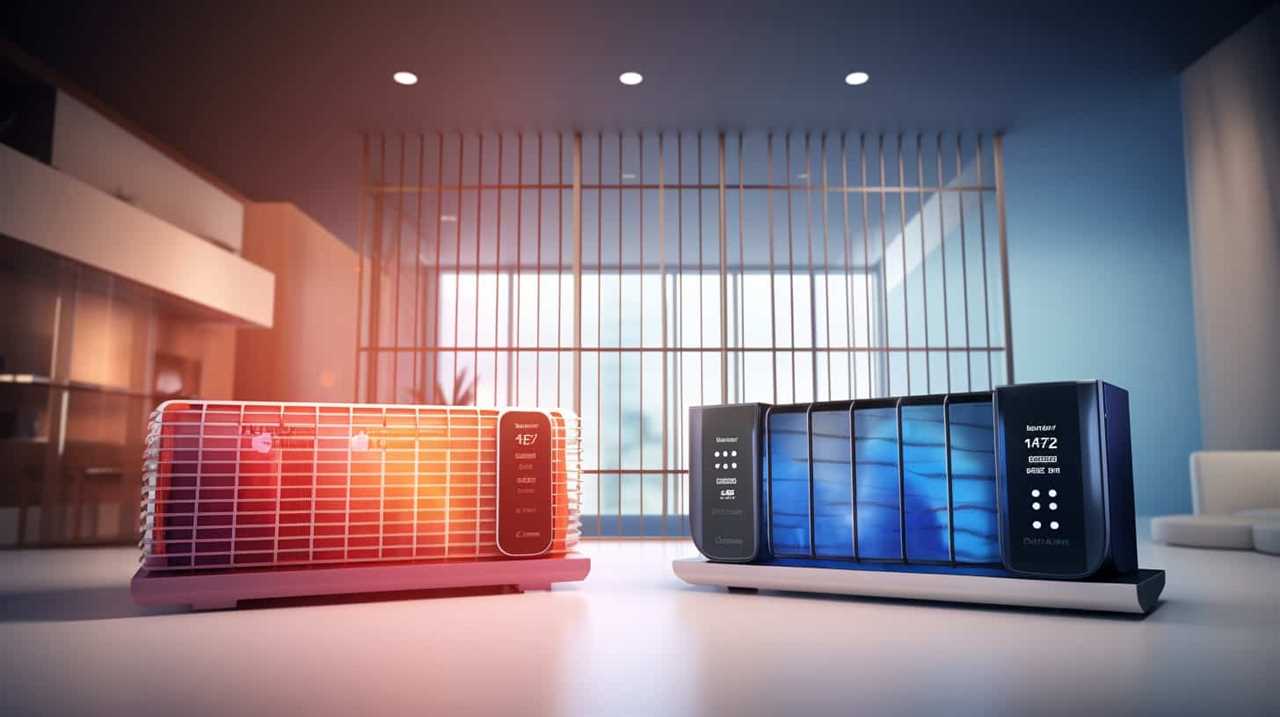
Additionally, it’s crucial to meet the electrical requirements for your heat pump installation. Consult with a licensed electrician to determine if your current electrical system can handle the load of the heat pump. If necessary, electrical upgrades may be needed to ensure safe and reliable operation.
Taking these steps will help prepare your home for a successful heat pump installation.
Step-by-Step Heat Pump Installation Process
First, we’ll begin by removing the old HVAC system and preparing the location for the new heat pump installation. This involves disconnecting the existing system, removing any ductwork, and ensuring the area is clean and ready for the new heat pump.
Once the area is prepared, we’ll begin the installation process. This includes mounting the heat pump unit outside, connecting the refrigerant lines, and installing the indoor unit. We’ll also need to connect the electrical wiring and thermostat.
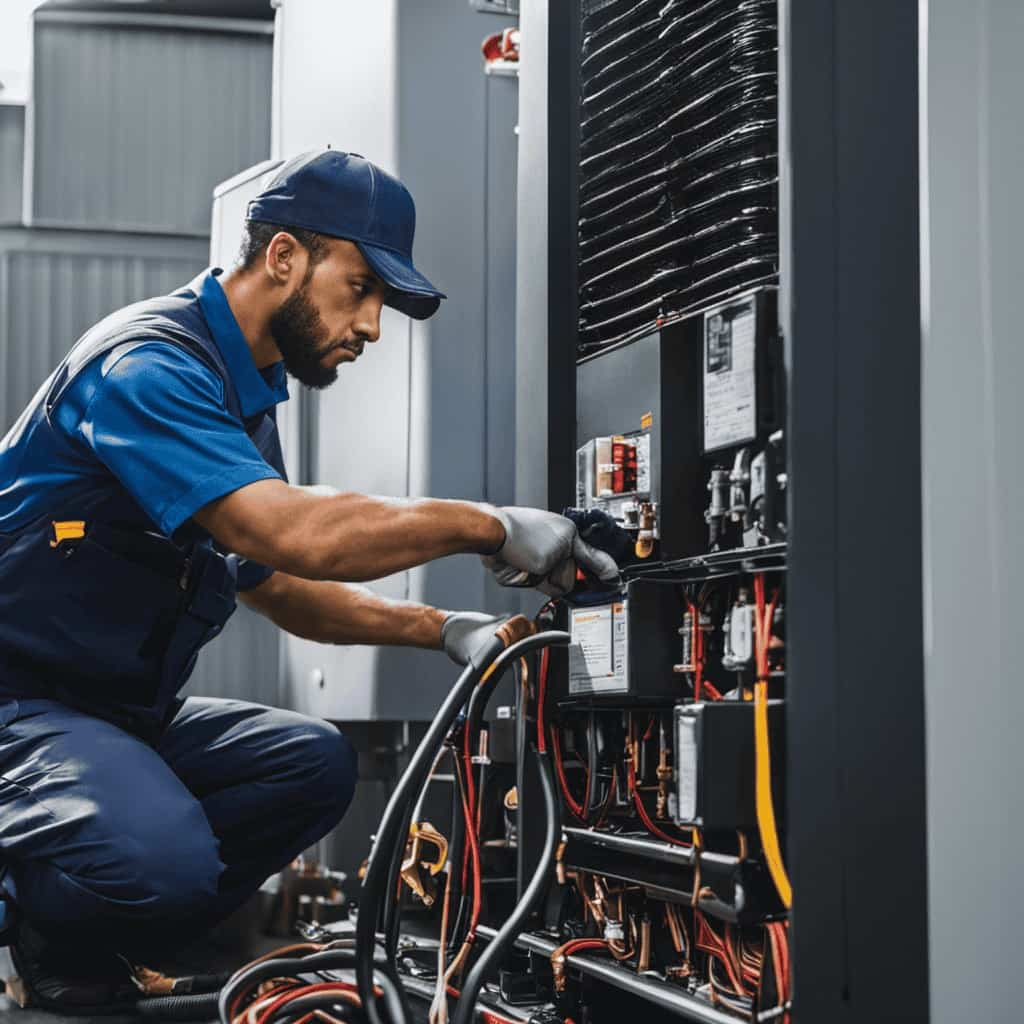
After the physical installation is complete, we’ll test the system to ensure it’s functioning properly. It’s important to note that regular heat pump maintenance is crucial for optimal performance. This includes cleaning or replacing filters, checking refrigerant levels, and troubleshooting any heat pump issues that may arise.
Frequently Asked Questions
What Is the Average Lifespan of a Heat Pump?
The average lifespan of a heat pump depends on various factors, such as maintenance requirements. It is important to regularly maintain your heat pump to ensure optimal performance and prolong its lifespan.
Are Heat Pumps Suitable for All Types of Homes?
Heat pumps are suitable for most homes due to their efficiency and cost savings. They can be installed in various types of homes, providing both heating and cooling capabilities.
How Often Should a Heat Pump Be Serviced?
Heat pump maintenance is crucial for optimal performance. Regular servicing ensures efficiency, prolongs lifespan, and minimizes breakdowns. Benefits include improved energy savings, enhanced comfort, and reduced environmental impact. Schedule annual maintenance to maximize the benefits.
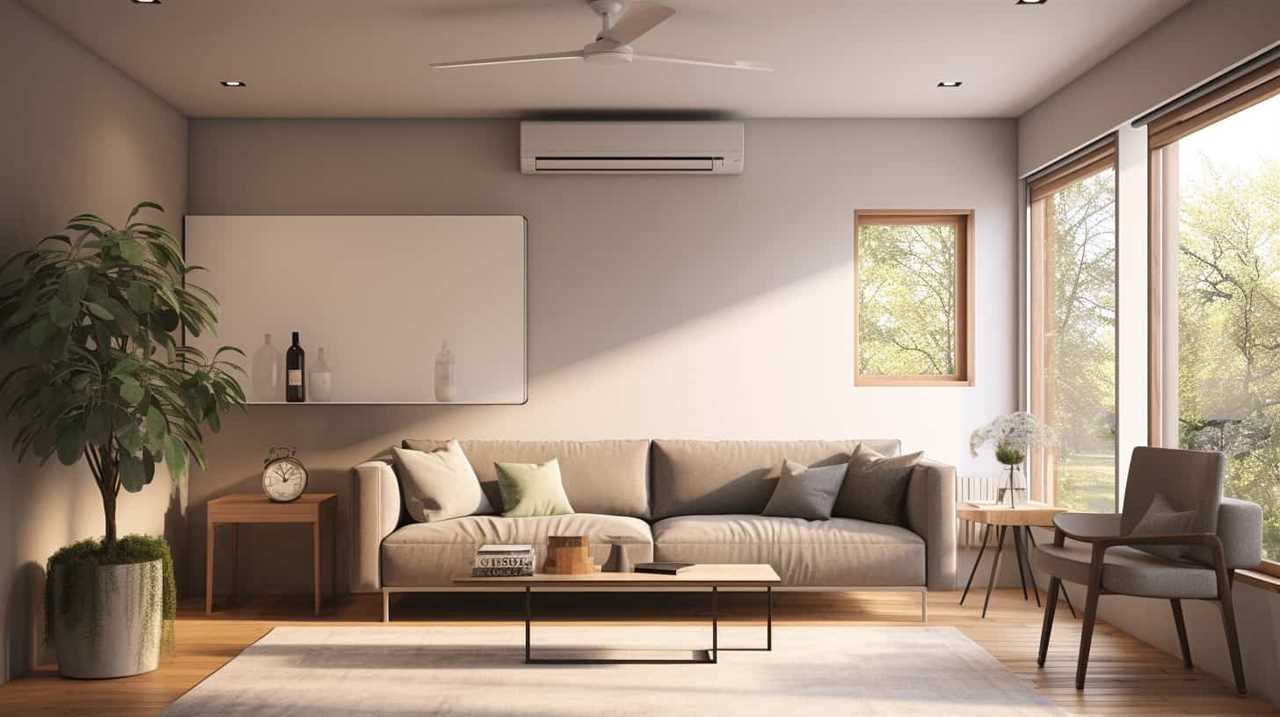
Can a Heat Pump Be Used as the Primary Heating Source in Colder Climates?
Yes, a heat pump can be used as the primary heating source in colder climates. It utilizes innovative technology to extract heat from the outside air and efficiently distribute it indoors, providing reliable and cost-effective warmth.
Are There Any Government Incentives or Rebates Available for Installing a Heat Pump?
There are government incentives available for installing a heat pump, providing significant energy savings and financial benefits. These incentives aim to promote innovation and encourage individuals to adopt more sustainable heating and cooling solutions.
Conclusion
So there you have it, folks. Installing a heat pump for AC is as easy as juggling flaming chainsaws while riding a unicycle on a tightrope. Just kidding!
But seriously, with the right knowledge and preparation, you can successfully install a heat pump and enjoy efficient cooling in your home. Remember to assess your cooling needs, choose the right size, and follow the step-by-step installation process.
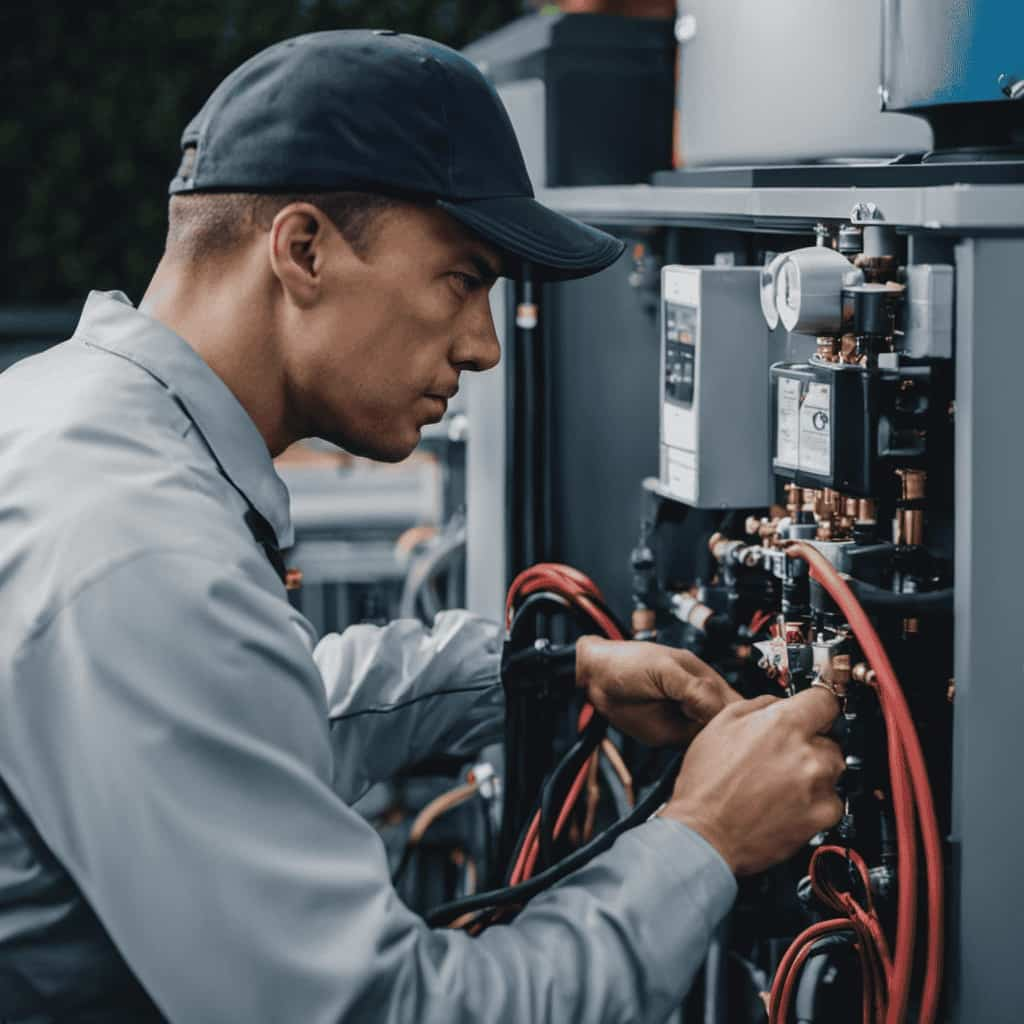
It’s like a thrilling rollercoaster ride, except without the screams and the fear of plummeting to your doom.
Happy cooling!
-

 Residential and Commercial Applications7 months ago
Residential and Commercial Applications7 months agoBest Amana Heat Pump Reviews
-

 Thermal Energy Transfer7 months ago
Thermal Energy Transfer7 months agoBreakthroughs in Modern Heat Pump Systems: Thermal Energy Edition
-

 Geothermal Heat Pumps6 months ago
Geothermal Heat Pumps6 months agoInnovative Geothermal Heat Pump Manufacturers Revolutionize Energy Efficiency
-

 Residential and Commercial Applications7 months ago
Residential and Commercial Applications7 months agoBest Heat Pump
-

 Geothermal Heat Pumps6 months ago
Geothermal Heat Pumps6 months agoUpgrade Your Comfort with Our Efficient HVAC Systems
-

 Air Conditioning5 months ago
Air Conditioning5 months agoExploring Energy-Efficient Air Conditioning Heat Pumps
-

 Energy Consumption4 months ago
Energy Consumption4 months ago10 Key Comparisons: Heat Pump Vs Traditional Heating
-

 Thermal Energy Transfer4 months ago
Thermal Energy Transfer4 months agoBoost Your Heat Pump Efficiency: Interactive Guide








